#am i reading too much into supernatural powers being a metaphor for queerness?
Explore tagged Tumblr posts
Text
Watching Teen Wolf Season 6b for the first time - Corey and Liam could literally just play the gay card lmao
#although liam isnt actually canonically queer so i understand why he didnt#corey could literally just claim a hate crime tho#i mean it kinda is#just toward supernatural creatures#am i reading too much into supernatural powers being a metaphor for queerness?#i think i might be reading too much into the supernatural as a metaphor for queerness#teen wolf#teen wolf season 6b#teen wolf 6b#corey bryant#liam dunbar
5 notes
·
View notes
Text
S13 Jack rewatch thoughts under the cut.
how did I not type this dude as a Enneagram 9; so much of Jack's personality clicks when you see it. think I've said before, but I read Sam as a 1, Dean as a 2, and Cas a 3.
in retrospect, Jack's becoming God ending seems obviously foreshadowed, although idk exactly when the writers decided on it. say: 13x01 establishes a God Who Doesn't Care in Chuck, which ultimate leads to the God Who Does Care in Jack in 15x19. in 13x02, Donatello literally mistakes Jack's power for God's. there's a Simba comparison! it's really right there.
I do still love the last scene in 13x02 -- it's unsettling in a way that really works. there's Jack's guilt and fear about his powers / who he is, if he's going to hurt someone w/ them, those feelings coming out in self-harm, how Jack stabbing himself directly mirrors Miriam attacking him in 13x01, and also Jack exploring the limits of his body and healing powers. in a very messed up way.
there's also this previous exchange from the ep (DEAN: Okay, see, sometimes, things hurt, so you just man up and deal with it. / JACK: Yes. I understand. Pain is a part of the complete human experience. Accepting it is a sign of maturity.) which is Dean having some not great ideas about pain/masculinity (altho tbh he's not entirely wrong either) but also Jack going way far with it too. I read Jack as not only responding to Dean but very much influenced by Kelly / her sacrifice / her knowledge passing down to him, and Kelly's explicit decision to endure something really painful and die to allow Jack to live. [yes, I am still fascinated w/ the implications of Jack in 13x01 saying he "was" Kelly and that's how he got his knowledge of the world.]
Dean telling Jack he'll kill him if it comes to it is obvs very messed up and understandable as to why Dean would say / think this and I like how Jackles plays Dean calmly, pragmatically in this scene; it's more interesting (and frankly more disturbing) than Dean's more simplified anger in the next ep. it's a heightened, horrible situation for both of them that's darkly compelling. I just love characters having a terrible time! what can I say!
kind of related: Jack's mirroring of Sam as the family black sheep / scapegoat was less frustrating the 2nd time around. or while I do still have issues w/ the framing, I can at least see what the story is doing with it. however, I do think the writing runs into the "super-powered character" problem where the story frames Jack as a good dude who's unfairly judged for his powers... but Jack can actually hurt or kill people with his powers, so isn't some caution & skepticism warranted? but metaphorically Jack's powers are connected to his self, so push-back against his powers becomes push-back against Jack as a person, even if those 2 things aren't technically the same thing. it's in the same vein as supernatural power as metaphor for difference (queerness, neurodivergence, etc.) which is a trope that can be problematic, or has limits, in its metaphorical usage.
where is the sicko version of the Lucifer - Sam - Jack scene in 13x23. the whole ep stands out to me as very indicative of Dabb's style and narrative interests -- dysfunction and violence within the family, the disturbing choice of "kill one of you or I'll kill you both," cycles of violence, hunters and monsters not being so different -- but without much... sexualized or eroticized subtext. (besides the one line of Lucifer to Sam, which contrasts to Lucifer being violent towards Jack but he's not creeping on him in that way.)
there's also a meta about S13 (and possibly later seasons / Jack's story overall) being modeled on the Hero's Journey, at least somewhat:
#1 = Ordinary World > Jack's birth and meeting Clark and his mom, doing normal things (eating candy!) #2 = Call to Adventure > Jack meeting and then hunting / learning how to use his powers w/ Sam, Dean, Cas #3 = Refusal of the Call > Jack running away from Sam, Dean, Cas / hunting #4 & #5 = Meeting w/ the Mentor & Crossing the First Threshold > Jack ending up in the Apocalypse World and finding Mary #6 = Tests, allies and enemies > Jack fighting in AW w/ the humans against the angels #7 = Approach to the innermost cave > Jack meeting Lucifer & engaging w/ him (and almost being swayed by Lucifer into leaving w/ him) #8 = The ordeal > Jack deciding to go back to save Sam, Dean, Cas, and Lucifer stealing his power / attacking him in the church #9 = The reward > Jack being saved by Dean (because Jack ‘chose’ right in picking family over power), Jack being accepted by both Dean & Sam as a part of the family
tbh I don't like the Hero's Journey as a narrative framework but it's obviously influential w/in contemporary screenwriting and explicitly w/in SPN, too.
1 note
·
View note
Text
RWBY Recaps: Volume 8 “Strings”
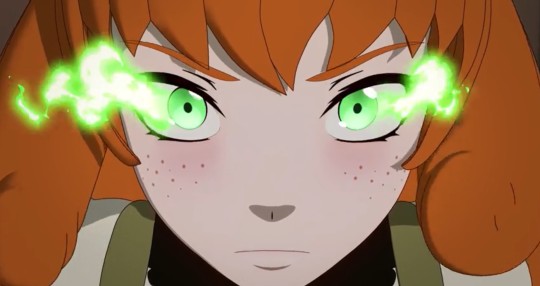
Happy Saturday, RWBY friends! I am, quite obviously, going to dive into the recap in just a moment, but first I wanted to take a short detour to discuss the elephant in the tumblr room. Namely, Supernatural.
For those of you out of the loop, the tl;dr is that a fifteen year, beloved show ended with a truly horrendous finale. Specifically, the finale rejected everything that the show had been building towards: the logical conclusion to character arcs, the theme that “family don’t end in blood,” the potential for a queer romantic relationship… I could go on. The point I want to make is that the fandom had every reason to believe we’d be getting these things. This isn’t a case of fans upset that the finale didn’t go the way they wanted as an individual viewer, but rather that the finale didn’t go the way the show clearly and explicitly said it would. It’s not an exaggeration to say that in many respects, viewers were straight up lied to.
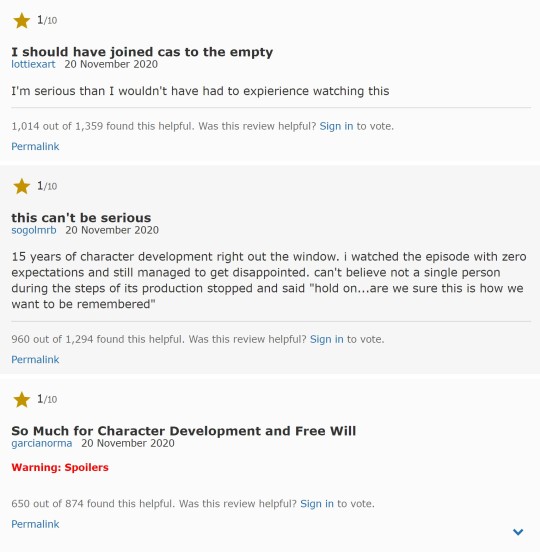
(I recommend reading the reviews.)
What does this all have to do with RWBY? Well, I can’t help but think that history is repeating itself. Certainly there are some notable similarities between the two series. Both have long, meandering plotlines with no clear end in sight (though I hope RWBY doesn’t reach the 15 Volume mark…). Both began with a small, core cast, but quickly expanded—generating the expectation that these now equally important characters will be given their due. Both have moved from the small conflict of fighting everyday monsters to a god-based mythology. Both have a popular queer relationship dangled in front of the viewers, featuring scenes where they’re “obviously” in love… but will it ever be confirmed? Both have a fanbase that says loudly and confidently that the writers know what they’re doing. Just wait! It’s all been planned! We’ll be rewarded for our patience and soon all the naysayers will be proven wrong.
Thing is, the Supernatural fandom wasn’t rewarded. Right up until a week ago those fans—myself included—had faith that the writers knew what they were doing because they can’t really be that out of touch with their own story...right? It’s not possible. Yet they were, it was, and now that I’ve gotten solid proof of precisely how far a show can go to reject its own logic, themes, and premise, that just makes me more wary of RWBY’s mistakes. Before I had a solid faith that things couldn’t possibly get that bad, that no matter how much RWBY might be messing up in the short term, it will undoubtedly pull it together overall, because what show wouldn’t? Especially a show with such promise and, at times, wonderful storytelling. Well, Supernatural didn’t manage it and frankly I’m not sure what to do with that information.
Seriously. I don’t have any grand conclusion here. It’s not my intention to suggest that anyone should stop watching RWBY, or to claim that it will absolutely fail because Supernatural did. Obviously, we don’t know what will happen until we get to see it in the show. I only want to acknowledge these parallels and the similar journey I see both fanbases on. I can’t help but wonder if, a couple years from now, RWBY fans will be making incredibly optimistic posts about how it’s all coming together, just have some faith, everyone who says that the group won’t get a satisfying ending, or Blake and Yang won’t be confirmed are just mean trolls… only to wake up that Saturday morning and get another metaphorical slap in the face.
It’s something to think about.
But here I’ve spent a page talking about the wrong show. Let’s get into the episode!
We open on a black screen with lots of ambiguous noises. At first I thought this was Oscar struggling in the Hound’s grip or something, but then I remembered that RWBY likes to insert an episode between cliffhangers. I watched Ironwood (presumably) shoot a guy and he only came back this week (though that question still isn’t answered. At this point I kind of wonder if it will be). Oscar was kidnapped last week, which means we won’t get to see him until next week. Or… two weeks from now? RT skips the week of Thanksgiving, don’t they? Sounds familiar doesn’t it? Something horrible happens to Oscar and we need to wait two weeks to find out how it’s resolved.
Watch him escape the Hound off screen and return to the group with a new outfit 😂
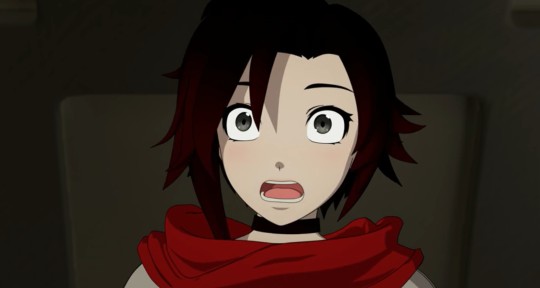
So it’s not Oscar we hear, but Ruby, the last one coming out of the tube. Weiss is in the process of pulling Nora’s ear for that stunt… with a frankly strange looking hand. What’s up with RWBY animating weird hands lately? I’m pretty sure that’s not how anatomy works.
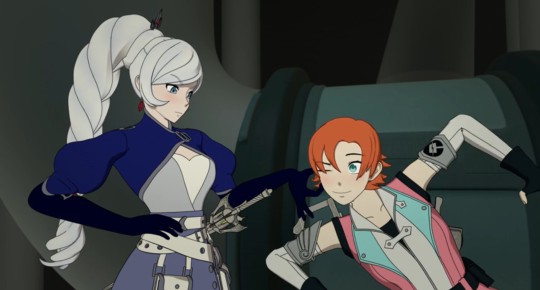
Anyway, Nora counters that this was a “Once in a lifetime experience,” but they were all going to go through the tubes regardless. Weiss isn’t pissed that you sent her through, she’s pissed that you did it unexpectedly when she was alone, heading into enemy territory. But of course, there’s no one in the room to hinder them, so the mistake is meaningless.
We’re setting the tone again though. For the first half of this episode everything is sunshine and giddy adventure, which doesn’t fit the situation at all. It also creates emotional whiplash when I’m suddenly supposed to be super worried about things later on. This sort of about-face works once in a blue moon, as an emotional punch, like we see in Mulan:
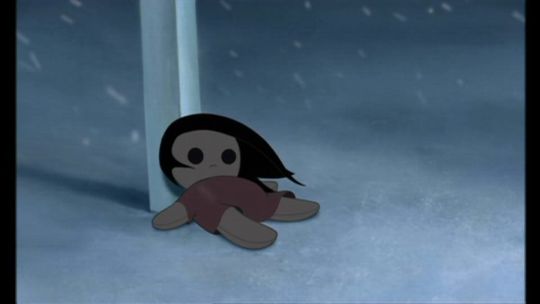
But RWBY does it every other episode, which makes the overall tone of the series confusing instead. Half the time RWBY feels like two different stories—the cartoony tale of girls going on fun adventures, and the traumatic tale of a fantasy war—that have been badly spliced together.
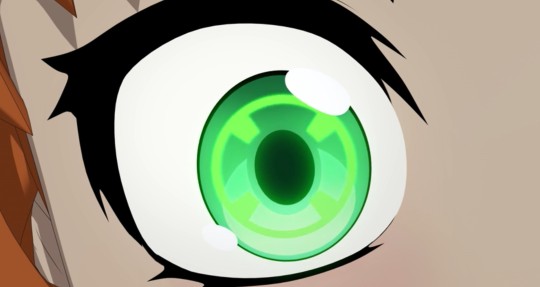
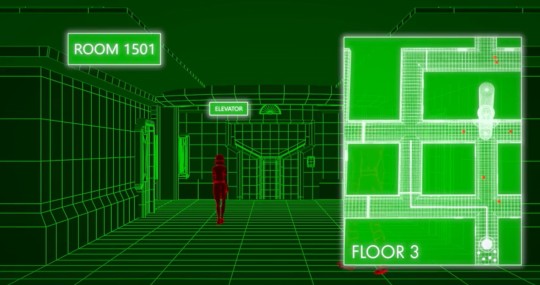
“Alight, Robo-Girl, which way?” May asks and Penny demonstrates why she’s the best for sneaking into a facility. She’s able to map out the whole place, including seeing where everyone is so they can avoid detection. Kudos to RT for going this route. I was worried that they would have Ruby and the others straight up attacking Atlas grunts, knocking them out/potentially even killing them because who cares, right? They’re the bad guys! So I’m glad they’re working to get in and out undetected. Granted, we see in some places that they’re clearly willing to fight the soldiers if it comes to that—they’re reaching for their weapons when Penny opens the final door, expecting the room to be full of people. They were going to attack—but at least they’re trying to lessen that conflict as much as possible. That’s the sort of choice I expect to see from heroes and I’m glad we got it here.
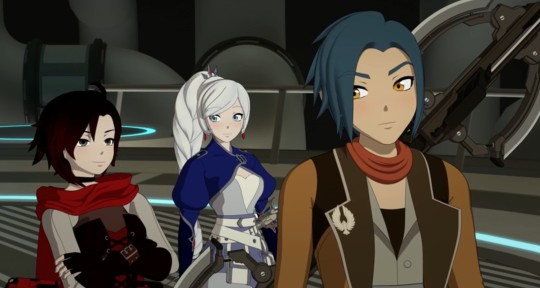
After scouting the area Penny corrects May: “And my name is Penny,” to which Ruby gives a satisfied “Heh.” I’ve got no problem with Penny rejecting nicknames, even potentially well-meaning ones, because she’s always struggled with her status as a real girl and her name is her own. She gets to decide what others call her. I do, however, have a problem with making the presumed trans character the one who is corrected. Granted yes, we haven’t gotten confirmation in the show that May is trans, but RT doesn’t get to cash in on that rep without likewise suffering the consequences for how the character is treated. You’re telling me that a trans woman is going to roll her eyes when someone asks her to use a specific name? Please give May flaws, yes, she’s a person, but out of all the millions of flaws across the human spectrum, this is the one we’re shown?
Not to mention Ruby’s continued attitude. It’s like, ‘Yeah, May. Stop being a horrible person who draws attention to the fact that Penny is a robot. I never did that.’ Except when Ruby first met her she didn’t know Penny was a robot. Just like she didn’t know Blake was a faunus—something we’re reminded of this episode. We might assume Ruby wouldn’t have ever made any missteps at the beginning of these relationships, but the fact remains that she got to know both girls before their minority status was ever revealed. Ruby loved them before she ever had to grapple with their differences.
Put in her place, May then demonstrates that she can make lots of people invisible, not just herself. That’s handy. She creates an invisibility bubble that reminds me of Harry’s invisibility cloak. In the sense that others might not be able to see you, but they can still hear and touch you, which makes sneaking around still pretty challenging.
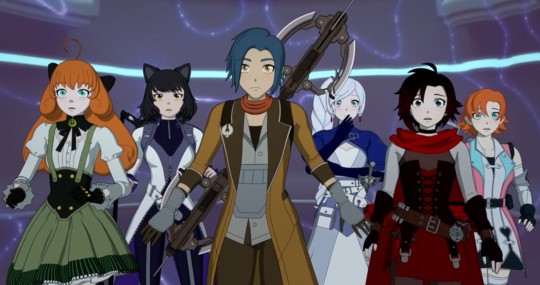
No sooner have I thought that then two guards get into the elevator with them. The group keeps quiet as the duo discusses how no one can get close to Salem’s storm without “getting shocked right out of the air.” Interesting. And frankly one hell of a roadblock if the Hound escapes into the clouds. Oscar may be gone for a while if he doesn’t escape on his own... The woman also comments about how creepy it is that all the grimm are just hanging out, waiting. It’s “worse than if they’d attacked.”
No it’s not! RT, stop trying to implement the idea that Salem withholding her forces is some epically cool choice. She should have decimated everyone by now and the fact that she hasn’t just shows how transparent the problem is: you’ve created a villain that’s too powerful and now you don’t know what to do with her.
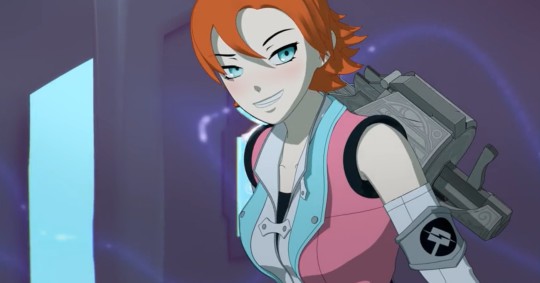
As the group sneaks out of the elevator Nora grins and presses all the buttons, which is, as expected, a dumb move. They’re supposed to be sneaking into this base. If they’re caught they’re going to be thrown in jail at best, killed at worst, but Nora wants to risk that for a practical joke? Again and again we see this insistence on incorporating comedy where it’s not only unnecessary, but actively interferes with other aspects of the scene.
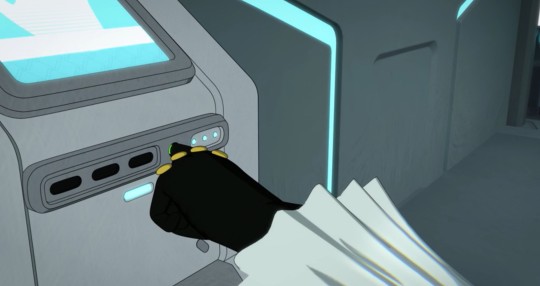
Reaching a terminal, Penny inserts her finger and gains access via Pietro’s credentials. She’s really demonstrating this episode why she’s… pretty terrifying? I mean, Penny is an incredibly powerful fighter with a computer’s view of the world, access to everything in the most powerful Kingdom alongside its information, and she now has Maiden powers to boot. Which, I should add, it took her one fight to master (because remember, the heroes are now always as strong as they need to be to win…). Now that Watts is planning to hack her, I expect her to be an incredibly formidable enemy, just given the amount she could potentially do. I think Penny herself is too kind to exploit all that potential and as we’ll see via Pietro briefly taking control, she doesn’t always have the knowledge to use the tools at her disposal. But in the hands of someone like Watts? He’ll turn Penny into the ultimate weapon.
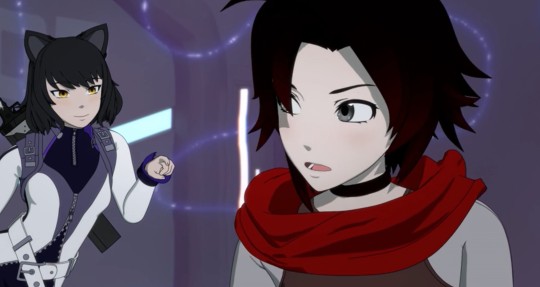
Access granted, they learn that they have to go “Right through central command!” Of course, Penny makes it sound like a fun game and the spy-movie music/cartoon lecture doesn’t help. Again, tone. It’s adorable! It just doesn’t fit sneaking into a military base with your lives on the line while Salem waits outside. That was a RWBY Chibi moment.
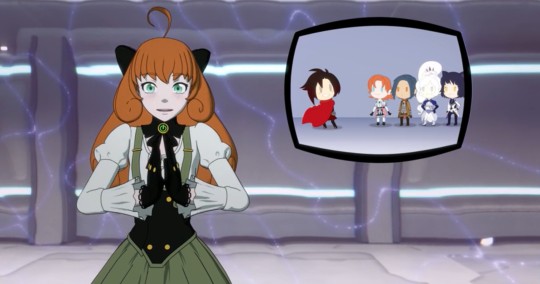
Penny explains—twice—that Ruby can use her semblance to fly them all through central command and it’s treated like a revelation. At first, I was pretty confused because Ruby has been dong this for ages? She carried Weiss in “Argus Limited” and Nora during the Geist fight. But upon close inspection, what Penny seems to have “figured out” is that Ruby can carry multiple people at once because the “mass doesn’t matter.” Okay. Not a contradiction then, though I think RT could have made it a little more clear that Ruby was shocked at the idea of carrying multiple people, not carrying someone at all.
What I do take issue with though is Ruby mastering this skill instantaneously. I mean, why is Ruby being forced to try this on the fly (pun not intended)—Penny has known the layout of the building since they made this plan. She knew they had to get past central control and that it would be packed with people. She’s obviously thought about Ruby’s semblance a great deal—and why is she succeeding? Give me a Volume 7 where Ruby actually trains in this technique, set up via Harriet’s comment early on about her semblance, and then she’s victorious here when it finally matters. Or give me Ruby assuming she can pull off this incredibly difficult skill only to fall out of her semblance halfway through, a roomful of Atlas personnel staring at them. Then what?
Not this.
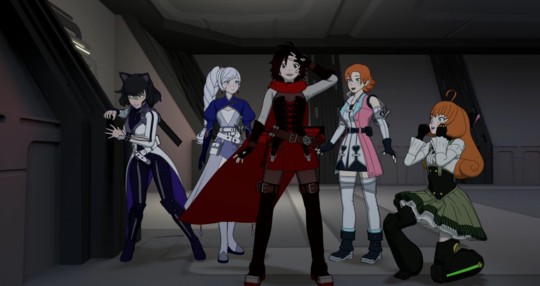
This is a character who does everything perfectly on the first try without ever having to fail. Ruby is boring like this.
Crisis averted, we transfer to Ironwood who is… working with Watts.

What else is there to say? I’ve already laid out all the reasons why this is stupid and makes no sense. Others keep coming onto my posts to explain to me how Ironwood’s awful deeds up until now fully show his decent into villainy, conveniently ignoring the numerous limitations he was under and his choice to do what he thought was best for the world using inaccurate information. Ironwood was always a divisive character and many are happy to ignore the years’ worth of deconstruction done—a man who looks like the Evil Military General but actually isn’t—because they never liked him to begin with. Not liking him is fine, no one has to like any character, but I’m honestly shocked by the number of viewers who refuse to acknowledge how bad the writing is, even if it means defending a character they hate a teensy tiny bit (#SupernaturalVibes). As a friend put it, Ironwood now feels like a caricature of his former self, a Pure Evil Ironwood who appeared out of nowhere and is now here to stay. He shoots kids. He shoots unarmed civilians. He teams up with Salem’s men and tries to hack Penny. These are undeniably horrible acts, they’ve just been given to a character who never would have done them until RT randomly flipped the Evil switch.
The “RWBY” tag, alongside all the fluff moments of this episode, is now filled with posts encouraging Marrow to turn, yelling at the Ace Ops for being “bootlickers,” and capslock screaming at anyone who dared to speak up for Ironwood. It still sucks to have bad writing twisted into an attack on the fans and it’s going to continue to suck until at least the rest of Volume 8. I’d like to again remind everyone that Qrow teamed up with Tyrian a few episodes, yet because he’s again in Ruby’s graces, that was twisted into a ‘not that bad’ situation. The issue isn’t really that Ironwood is teaming up with one of Salem’s subordinates, but that he’s doing it to go against RWBYJNOR… the second a character teams up with Salem to get what Ruby wants (to not have her team in jail) then that’s totally fine… but that’s a wrinkle a lot of people are happy to ignore.
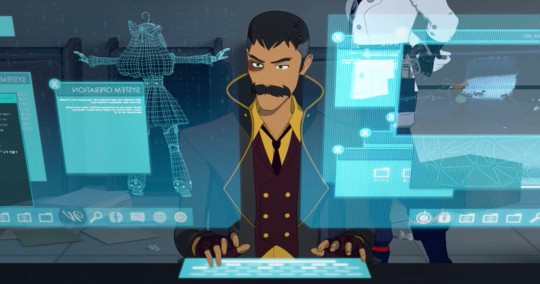
So yeah, Ironwood is an idiot now too. Like Qrow also was last Volume. He really thinks Watts isn’t going to betray him somehow? Although, I do wonder if the chance to ruin Pietro’s creation outweighs his loyalty to Salem, but the point is that Ironwood can’t be sure of that either. At least he’s smart enough to keep Watts under continuous guard. He puts his hand on Watts’ shoulders and goes, “I’d hate for us to have to try motivating you. Again.”
So he tortures people too now? Like I said, caricature. This was Ironwood and we were given no clear idea of where he disappeared to.

RIP a great character.
Watts notices though that Pietro has apparently accessed a secure area and alerts Ironwood to it. I laugh that the information is just ¡EMERGENCY! In large, red letters. Ironwood immediately makes an announcement for everyone to be on guard. It’s a level 3 lockdown — that won’t impede the group leaving via airship! — and they’re to use “lethal force” if necessary. Weiss is disgusted.
As much as I disagree with making Ironwood into a shoot first, ask questions later kind of guy — he’s definitely wrong to be doing this — I also find myself rolling my eyes at reactions like that. Yes, Weiss. You attacked four operatives until they were knocked unconscious. Prevented an entire city from escaping Salem’s wrath, endangering them all. Now you’re breaking into the most classified room in the Kingdom to steal an equally qualified project and use it for your own means. There’s no reason why Ironwood would level his might against you. Is death still an extreme response? Yes. Should Weiss be acting like Ironwood is crazy for responding to them in an extreme manner? No. Her remark makes it sound like Ironwood is attacking her poor, innocent, defenseless team… not the team that’s been lying to him, betraying him, attacking him, and stealing from him. Not the team carrying deadly weapons into a facility to take what they want at any cost.
With their presence known, May wants to go grab an airship. That’s the series now.

Meanwhile, Penny insists that they can still complete their mission and we see Nora come up with some sort of plan.
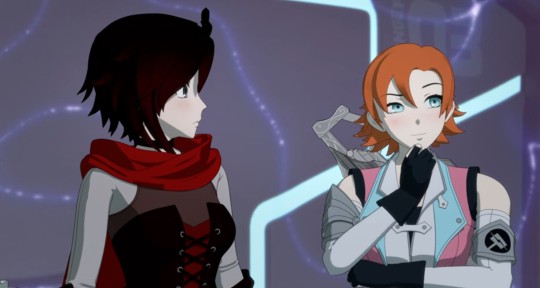
Except, what plan was this?? What did she say to the group? ‘Hey, let’s wait around until some guy conveniently walks by with a full cup of coffee. Then we can trip him and the mug will fly alllll the way across this gap to land on a terminal, startling at least two workers. Except this guy will be hated by the whole room because he’s always messing things up—his coffee mug has been changed from #1 Dad to #1 Dud—so that this little mishap will create a ruckus that gets everyone involved, giving us the opportunity to slip by them all.’
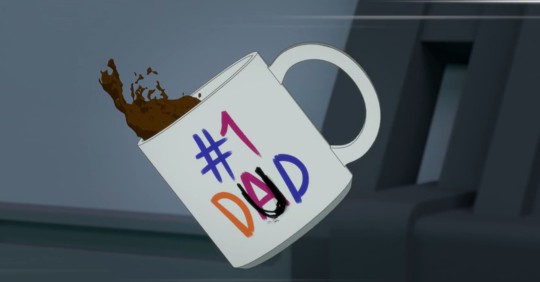
Seriously, what? This kind of “plan” only works with someone like Clover, where we know he has a good luck semblance and thus all these unlikely pieces fall into place. I could absolutely buy Clover smiling smugly, working under the knowledge that he just has to wait around a few minutes and something will come along that works entirely in his favor. But Nora? How did she know any of this would happen? Obviously she couldn’t have, so what exactly was their intention if this coffee carrying, hated guy didn’t show up? RWBY, your contrived plots are showing.
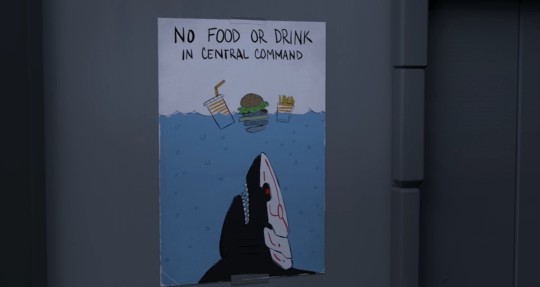
I do, however, love the grimm Jaws poster. Jaws is an absolute favorite of mine, so seeing a reference to it in RWBY? A funny one at that? It almost makes up for how bad this episode is lol.
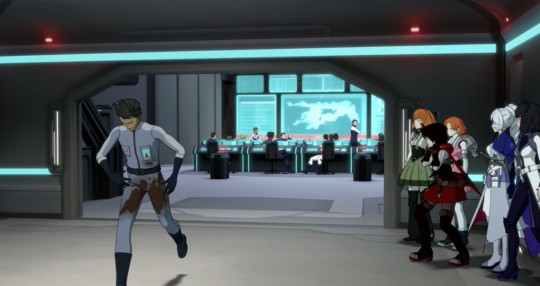
Because frankly I’m bored. The group sneaks around, criticizes May and Ironwood, briefly confuses me about Ruby’s semblance knowledge, and gets through tons of Atlas personnel in the stupidest way possible. I have to watch this guy running out of the room with coffee on his pants screaming, “WHHHYYY???” and he doesn’t notice the five girls standing right next to him. It’s silly. It’s boring. Luckily for RWBY, things are about to pick up in the second half.
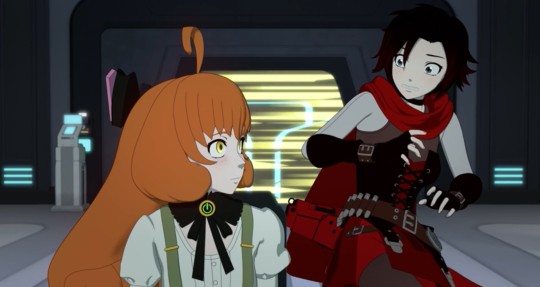
After Ruby gets them upstairs and the final room is also conveniently devoid of people, Pietro takes control of Penny—including yellow possession eyes like Oscar has with Ozpin—and he...gets Amity started. That’s it. After a whole volume of ‘It’s not finished yet’ and ‘We barely have the resources’ and ‘Robyn stole what we were using to do idek what with’ he presses buttons for a while and they’re in. How good for them!
I do love that Penny calls Pietro “Dad” though. I’m here for the android-father relationship.
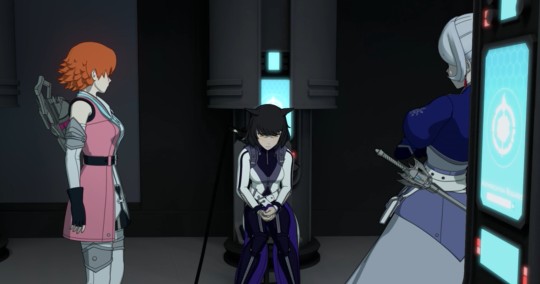
While Pietro works we turn to Blake, Weiss, and Nora. Blake tries to convince the audience that Ruby and Yang had an actual fight with, “I’ve never seen Yang and Ruby fight like this.” Yeah, because no one in this group has ever said the sliiiiightest thing against Ruby, so you all read the tinniest disagreement as a “fight” to be worried about. I mean, doesn’t RT have friends to draw inspiration from? They’ve never disagreed about Huge and Complex Questions before? Never gotten pissed and then shrugged it off the next time you want to text? RWBY’s idea of a diverse friend group feels like many other writers’ idea of a sibling relationship: anyone with an actual sibling goes, “What is this?” Speaking of, Weiss explains that sisters often have “very different ideas about what’s right” as if, again, people don’t have different ideas? Just in general? Why is this suddenly a sister thing? She’s clearly thinking about Winter, but doesn’t actually bring it up, so all we’re left with is the same situation we had last Volume. Weiss thinks she’s right, Winter is wrong, and they’re just going down their separate roads because there’s definitely no reason to re-examine any choices here. It’s all static.
Until Winter betrays Ironwood, of course.
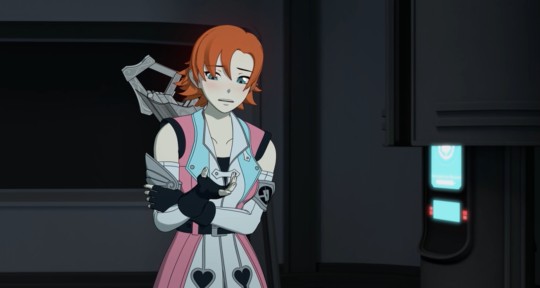
Nora tries to reassure Blake that the group will be fine (ha) even though they’ve split, the irony being that we, the audience, know they just got wrecked by the Hound. Jaune is a great leader though, Oscar has grown so much, Yang could defend them all in a fight, and Ren… well, she can’t think of anything to say about Ren. I hate the Nora is acting like Ren has drawn away from her for no reason, after she chose to kiss him—without consent—rather than listening to what was bothering him, then proceeded to pretend that this mystery problem never existed. What does she expect? I do, however, like the general acknowledgement that she doesn’t know who she is without Ren. Who is Nora? Someone who is “strong and hit[s] stuff?”
See, this feels like RT writing self-consciously because Nora doesn’t have much of a personality. Oh, on a surface level she’s bursting with it, but past the bubbly exterior? That single layer? We can add maybe one thing to this “Likes Ren, is strong, hits stuff” list: she’s funny. That’s it. Anything else we might add like “she’s loyal” or “she’s kind” is just a generic characteristic of this entire team. They’re all meant to be crazy talented good guys and even the “is strong” aspect is suspect when others frequently pull off attacks as showy as Nora’s hammer hits. So who is she? What are Nora’s dreams? What are her hobbies? Her fears? Her history? We’ve seen a single flashback of her on the streets and one scene back at Beacon where she listens to music and reads a magazine. Seven years worth of material and that’s it. There’s a reason why the go-to, non-combat action for Nora in fics is “makes pancakes.” We know so little about her still.
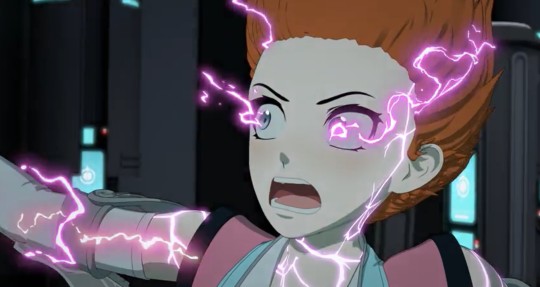
So I was excited for a brief, shining moment. Yes! Explore who Nora is outside of being strong and hitting stuff! … and then her big action this episode is, as she says, being strong and hitting something. Don’t get me wrong, outside of that setup it’s pretty epic. I like Nora going to those lengths to save Penny and I absolutely love the repercussions of the choice: a broken aura, passing out, and badass lightning scars all over her arms and neck (especially when women often aren’t allowed to accumulate scars in visual media). That’s pretty damn awesome. It’s just that it comes on the heels of the story insisting that Nora is more than this, that we’ll learn something new about her… and we haven’t. This is indeed cool, but we already knew that Nora was willing to crazy lengths by hitting things really hard. That’s already her established norm.
At least this moment has some really nice characterization alongside the stupidity. The conversation between Ruby and Penny is just plain stupid. Penny wants to stay to help with the evacuations, but Pietro says she should come with him in Amity. Why? As Ruby says, because then she’ll be up in the sky and Salem won’t be able to access the relic.
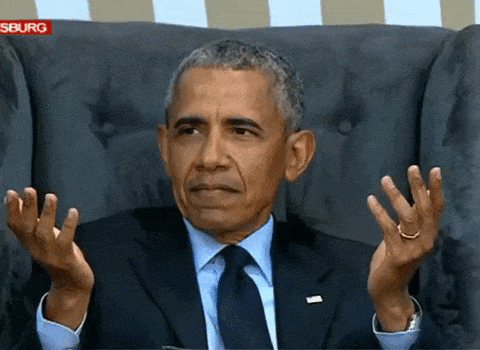
That’s what Ironwood wanted to do! We could have had this conflict episodes ago with you all working with him! I really can’t with this cast. Also, the rest of this is still confusing. I thought pretty much everyone was in the slums by now, so what evacuation are they talking about? Do they plan to evacuate everyone in Mantle out of the kingdom somehow… like Ironwood wanted to do with Atlas? And why are they acting like Amity is evacuating some people too? I thought they were just using it as a communication device? To add insult to injury, Ruby then contradicts herself a minute later when she tells Harriet that Ironwood can’t have the relic because “Salem will find her way to the relic no matter where you go.” Ruby, if Salem can access the relic high in the sky she can also access Penny in the sky. If you believe that literally nowhere is safe then why are you sending Penny away under the claim that she—and via her the Relic—will be safer? If you want Penny in Amity to lessen the chance of Salem getting the Relic, why can’t Penny be in Atlas while simultaneously (hopefully) getting a whole slew of people to safety?
I’m continually confused by this “plan” of theirs. Their claims just flip-flop according to what (supposedly) contrasts them with Ironwood. Even though that’s not actually the case.
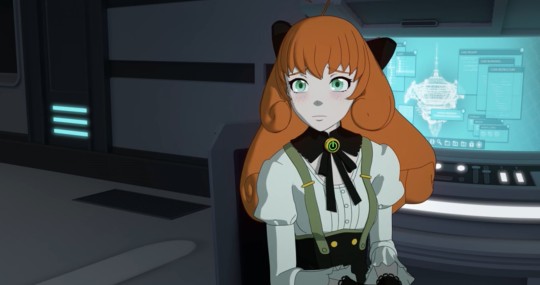
Penny is me, sad while watching this train wreck of a scene.
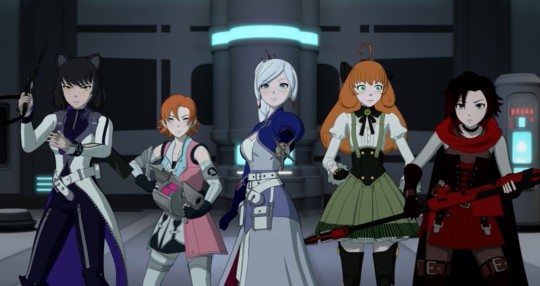
So yeah, the Ace Ops are here. I’ve wondered since the trailer why Weiss looked smug while everyone else was startled. Turns out it’s because of her line, “So, your first time losing to us wasn’t enough?” I can’t express how much I dislike all the girls’ personalities now. I want to shake some compassion and humility into them. Plus, they never should have won that fight in the first place. Marrow yells, “We were holding back!” but coming from the team’s weakest member it reads as defensive. Like we’re supposed to go, ‘Lol yeah right, Marrow. Just admit you got your ass kicked,’ even tough the Ace Ops should have wiped the floor with them, holding back or not. That’s my biggest takeaway from this fight: it’s the reverse of what we should have gotten. The Ace Ops should have beaten Team RWBY with ease and struggled greatly against an android Maiden, not falling before a bunch of teens and succeeding against Penny if not for Nora’s timely breakthrough. Your half-trained cast of growing heroes should not come across as more powerful than an intelligently designed weapon now wielding magic.
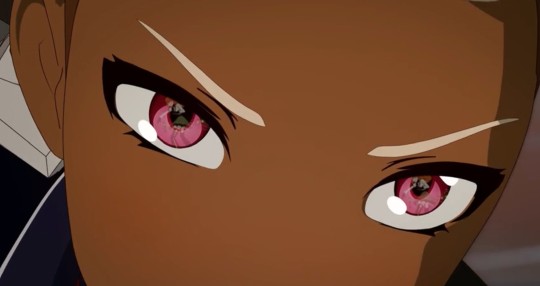
Before the fight starts we get a whole lot of lines that are, frankly, frustrating. Vine tells Penny, “I thought you were supposed to protect the people, not hurt them” which is true enough. Penny is taking action that is putting a lot of people in danger, regardless of the fact that Ruby is at the helm. Problem is, the Ace Ops then blame her for Winter’s injuries and “stealing” the power? That’s not the issue here. The issue is Penny’s blind loyalty to Ruby, but by having the Ace Ops back a stance that is clearly inaccurate—Penny didn’t cause Winter’s injuries, Cinder did; Penny didn’t steal the powers, she was encouraged to take them—it makes them come across as Very Evil people who will twist things to make poor Penny look like the villain. Even if this is a case of Ace Ops having bad intel (which seems unlikely. Wouldn’t Winter have told them what happened?) RT has avoided letting the Ace Ops take a justified stance here because that would make them look too sympathetic… even though they do have multiple justified stances to take. Like, ‘Hey, stop keeping half a kingdom here where Salem can easily kill them all’ or, ‘Hey, why did you spend months betraying Ironwood and then turn on us instead of trying to find a compromise?’ Even, ‘Why did your uncle help kill our leader?’ There’s plenty that the Ace Ops should be rightfully pissed about, so choosing Penny and Winter out of everything feels like RT is firmly backing them into Ironwood’s corner: you’re just bad now and bad people blame innocent girls, rather than acknowledging the actual wrongs done against them.
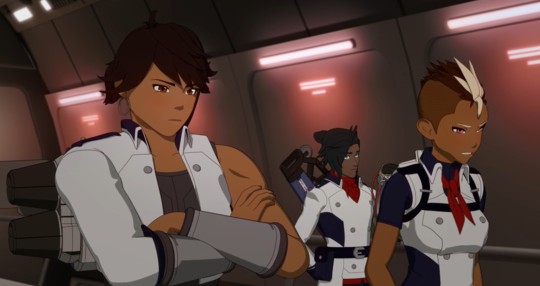
So we have Ruby contradicting herself and the Ace Ops backing warped ideas that make them look worse than they actually are. Adding to the stupidity is the fact that Elm mentions that Winter is in “critical condition” and Weiss… doesn’t care. Harriet then tells Ruby that she’s “throwing [her] in jail right next to your uncle, runt” and... Ruby doesn’t care. Qrow is missing and Ruby just found out he’s been captured by Ironwood, yet there’s no reaction whatsoever. This show continues to go hard on the ‘screw adults’ mentality, huh? Ozpin needs to keep quiet and is horrible for coming back. Ironwood is now a cartoon villain. Winter made the wrong choice so no one cares about her anymore, not even her sister. The Ace Ops remain enemies despite trying to talk things out. Qrow? Barely know him. Who’s he? This is a Ruby loves Penny episode. There isn’t enough emotional nuance for her to care about him too.
The sad thing is I adore Nuts&Dolts. In a different context these moments would be a goldmine for me.
If anything, this episode feels worse than the majority of last week’s because there are good things here that have been thrown into a bad setup. I can’t get excited for the group’s battles when I see who they’re attacking. It’s hard to squee over Ruby hugging Penny when she doesn’t react to Qrow. Watching Nora go all Thor feels like it only has half its potential when it’s coming out of a very messing, ‘I’m more than just being strong and hitting things… which is why I’ll continue being strong and hitting things.’ RWBY has excellent moments set into a terrible story.
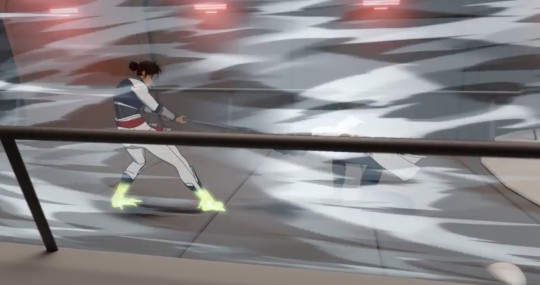
The fight, at least, is exciting. The Ace Ops goad Penny into stepping away so they can trap the rest of Ruby’s team—smart—and she’s forced to hold her own while Weiss tries to break through with her knight, then Nora overloads the system. To be frank, I’m not great at analyzing combat. Not unless I’m looking for something specific like whether a win is justified. I’ve already mentioned above the broad issue of the Ace Ops very nearly beating the most powerful fighter next to Salem herself, yet failing so spectacularly against Team RWBY. Outside of that context though? I really enjoyed this. Lots of tight action, creative attacks, teamwork, some emotional pauses throughout… it feels like a pretty solid battle. Put it on Youtube as a clip, outside of the rest of the story’s messiness, and you’ve got yourself a fantastic watch.
We can’t stay in the combat forever though. During all this Weiss calls the Ace Ops “cowards” for making it four vs. one. You know, RWBY should really just do away with dialogue and make the show purely action because the cast frequently sounds so stupid when they speak. Like her comment about Ironwood’s lockdown… really Weiss? ‘Yes, we might be wanted criminals who betrayed this group in the worst possible way, but how dare they not do the honorable thing and have three of their teammates sit out while trying to capture us? Even though the girl they’re trying to capture has magic. I mean, the nerve of them!’
Weiss, at this point I’m not sure how to explain to you that the people you’ve made into your enemies do not owe you a fair fight.
Another detail: we get to see Ruby fall off the edge of the walkway and this time she remembers she can fly! A definite improvement from Volume 6.
Finally: by the time Penny’s eyes go full Maiden in Elm’s grip, I think we’ve seen everything from our trailer. Episode 4 will truly be a mystery.
Ironwood has, of course, been watching the fight this whole time. When it looks like the Ace Ops will lose against the team he means to send in reinforcements, but Watts says he has “a message for your operatives.” Instead of capturing Penny they steal one of her swords instead, ending with a shot on Marrow looking conflicted.
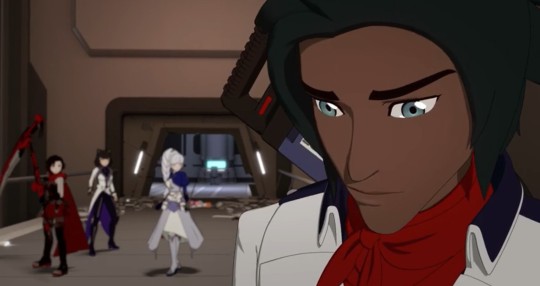
Because remember, there’s no actual moral grayness in this story. The protagonists are right and everyone else is wrong. It’s (supposedly) black and white. Which means that if the Ace Ops have any hope of surviving this Volume and being seen as anything other than evil bootlickers, they have to join with Ruby. Marrow seems primed to do that.
Am I surprised? No. Disappointed? Always lol.

May has the airship ready to go and they fly off… despite the shields. And the lockdown. Consistency? Who’s she? Nora is said to be “in bad shape” and after another hug Penny leaves to hide in Amity, even though Ruby thinks that hiding is a useless, cowardly choice. Just not when she and her allies choose to do it.
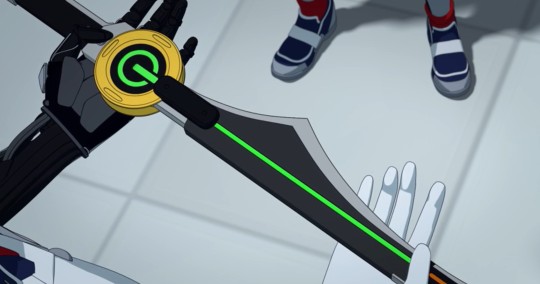
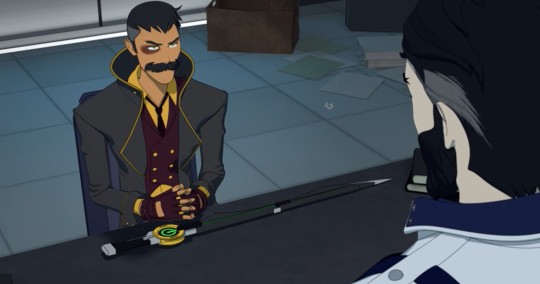
We end the episode with Watts receiving Penny’s sword and making the statement, “If you can’t beat them… then make them join you.” I have to say, his cheesy villainy is something I continue to enjoy, even if it’s heavy handed at times. Watts is just fun. I do have to say though: if Penny is hacked, what does that say about her agency? We double-downed on the ‘real girl’ narrative by giving her the Maiden powers, but she’s simultaneously synthetic enough that a single piece of her can remove all autonomy? It once again feels like RT isn’t sure what point they’re trying to make, they’re just chucking a lot of themes at the wall and seeing what sticks. Still, we’ll have to let it all play out before making any judgements.
And that’s it for this week. It seems like this is a slightly shorter recap than normal, though that may be because I struggle with discussing pure action sequences, which made up a decent chunk of this episode. I’ll no doubt return to the Ace Ops vs. Penny fight when I’m not on a self-imposed, one day deadline for posting. The only thing left is to update the Bingo Card, but I don’t think we made any headway this week. So... good job, RWBY?
I’m still going to hold off on the civilian’s square until Salem’s army actually attacks, as well as the two day timeline square.
No Winter this episode
Watts is teaming up with Ironwood which is… so much worse than him teaming up with Jacques again. Does a square get an X if the canon is even worse than what you assumed it would be??
Maria was mentioned this episode. Jury’s out on whether she’ll actually do anything.
Atlas is still standing, we knew Penny was heading towards a hack so it’s not much of a cliffhanger, no Qrow, no Ozpin, no Neo or Cinder.
It certainly looks like we can check off “The team gets Amity up and running,” but let’s just see if there are any problems next episode. If the problem is only ‘We would have launched it if not for Salem’s attack’ or something, I’m checking it off. The point is it would have worked.
I’m also leaning towards “More obvious Blake/Yang implications without confirming a relationship” given Blake’s heart-to-heart with Nora… but let’s see if the Volume does anything more egregious.
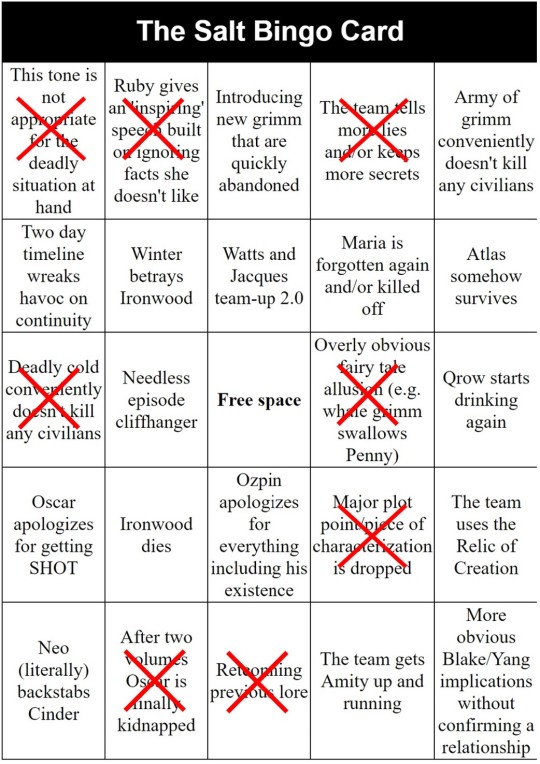
All in all (and perhaps despite what I’ve written above), I don’t think it’s fair to totally drag this episode. As said, this feels like a strong episode in a bad story, something that I would have LOVED if a) Salem weren’t here and b) the ‘ethical dilemma’ wasn’t boiled down to a ‘Team Ruby is good’ and ‘Ironwood and everyone associated with him is evil’ situation. It’s an episode whose tone and character action belong in a different version of RWBY. If you gave us this fun episode in an earlier Volume against a Pure Evil antagonist? It would have been great.
Ah well. It is what it is. Expect more emotional whiplash when we come back and everyone learns that Oscar has been kidnapped by Salem’s talking pooch 🙃
See you then! 💜
#rwby#rwby spoilers#rwby volume 8#rwby strings#mymetas#rwby recaps#apologies if this Recap is messier than normal#I have a zoom meeting in five minutes lol#gotta go fast!
54 notes
·
View notes
Text
I have been through this journey before, so I get to be actually frustrated about it.
IUnder a read more because im not subjecting y’all to this. Also: I should caveat I haven’t watched the episode cause I’m waiting till its on Netflix but I have watched way too many other episodes of Supernatural so I have a right to say these things.
TL;DR: I mean you all knew Cas’ confession was fucking bullshit and that SPN is...hm. But I’d like to actually express my genuine frustration, for a moment? I’m going to say things you already know, but I have too much knowledge of this show and too much stupid meta in my brain about a series I haven’t genuinely enjoyed for at least 5 years which makes this not just blandly bad but disgustingly insulting to me not even as a gay just as like. A writer?
Or, even shorter: Cas’ confession is just a Charlie Bradbury Speedrun
So. As some of you may know if, for some reason, you followed me back in 2013 (and till...okay fine 2015), I used to be, uh. Really into SPN. Really, I was into Destiel. Like, as in, I slogged through seasons 1-3 to get to Cas and am also really vulnerable to the Sunk Cost Fallacy and projecting onto characters. (I was in 8th grade in 2013, okay? Get off my back)
Also, because I monopolised use of the TV, I kind of...also got my parents into it? In a “this is silly but fun” kind of way.
Over time, critiques of the show from viewers, learning what queerbaiting is at all, fatigue with how long it was going, and also fatigue from how characters I enjoyed, like Rufus, or Crowley, or Ellen, or Jo, or Kevin, or Charlie, or Cas a few times, kept getting killed off. As time went on, it didn’t escape my notice that, aside from Cas, all of these characters fit one or more of the following criteria:
They were a woman
They were a person of color
Were Queer or Queer-coded in some way (listen Crowley was bad rep but at least Mark Sheppard actually kissed a man on screen)
I also just...generally got tired of the way the show treats women and sidelines people of color.
The final straw really came with Charlie’s death. It got us all excited, because she hadn’t been back in a bit! And it was interesting to see how reuniting with her dark side from Oz had changed her! (yeah remember the fucking Wizard of Oz storyline? The writers sure don’t!) And maybe she’d get developed! Because at this point, Charlie and the fairly good writing of her character was a major upside for the series! Charlie was cool, fun, gay, and morally complex in a way...none of the female characters had been before her, in large part because by definition, her relationship with the boys would always be platonic.
And then. Offscreen. She is violently murdered. For no damn good reason. Like, literally, her being brought back in this episode after fucking off to europe after having returned from fucking off to Oz seems to have filled two purposes in total.
The codex is solved (but Sam doesn’t know till next episode)
Charlie is dead, which means Dean can be angry, specifically at Sam, and kill more people because he’s the big bad this season.
That’s it. Two things. Twooooo whole reasons to do this episode. Whoopee.
But you didn’t come here for this, you came here for me to rip this reveal to shreds. Don’t worry, I’ll get there. What I want in your minds is that Supernatural already had a really good anddynamic queer character. And then they killed her off to make Dean angry. No, it doesn’t matter that they brought her back in season 13 or whatever. They made that decision.
After the rage this incited, I started realizing general flaws in the writing (I had probably already noticed them but now I was angry enough to complain.) Every conflict is born of Sam and Dean not communicating/taking on burdens and Dean being angry at Cas for reasons that ranged from good to ridiculous, but in a way that always went way too fucking long, (which...yes, does make the “you do it for love” gifs fucking hilarious). It didn’t help that seasons 11 and 12 were next, which meant Demon Dean and GOD’S FUCKING SISTER, plus the decision to resurrect Mary, which, while I do like her later scenes, as a season 12 finale it...well I’ll be honest it kinda sucked. It undercut the majority of the Winchester’s’ arcs and their slow and painful journey out of their father’s toxic vengeance quest and knowing Mary as a person when it’s too late to know her was one of the last semi-compelling grounders of the narrative.
By this point it was a hate-watch for my parents and I.
So then, I’m at college, and I’m not watching anymore cause I don’t have the motivation or access to Hulu to continue, and SPN is bad. I watch the Scooby Doo crossover when it comes out and my friend and I make fun of it, and we also continue making jokes about Dean and Cas and queerbaiting because we’re queer, but I don’t keep up. My Dad does though, so when I return, I watch some with the fam and lads. It’s even more tiring without context.
So flash forward to Quarantine, my sister, the only one with taste, has left, and we have run out of netflix to watch. So we return to the well, and seasons 13-14 are. I’m gonna say it. Bad. Really fucking bad. The cycle of bad communication continues, season 14 has like seven antagonists and the way it’s structured makes it so I literally cannot remember the timeline of a season I watched 3 months ago. Oh also, they have a queer coded cannibal snake monster for...well I guess Jack’s snake bud was cool but like. Huh wow it’s almost like these writers don’t handle queers well.
Our one saving grace is Cas, but he’s barely in any episodes, though I did note that his deal with the empty, being happy completely for one moment killing him, that struck me as “this has potential and I know they’re gonna half-ass it somehow.” Also Jack and Mary, but then oh...plot….The most compelling it gets is literally the finale.
But then, 3 days later, the first half of season 15 comes out on Netflix and it’s...actually kind of acceptable. The new character they give Jack’s actor is fun to watch him play until they make him evil. Exploring just how toxic Chuck can be gave the series direction again. The alternate future was genuinely scarring, and Eileen’s return was genuinely moving. Most of all, though, Cas got the opportunity to tell Dean no, that Dean was being unfair to him, had always been unfair to him, and he was sick of it. I had no illusions, I knew Destiel was never gonna happen, and Cas was gonna die, but giving him that bit of agency, letting Cas grow and be self-sufficient, and be angry with Dean not for existential reasons but interpersonal ones, was such a good sign for me, and Dean grew too! Dean fucking apologized for being horrible and Jensen Ackles had a...yknow what, ill give it to him, he had a good acting moment.
But the thing. About. The “I love you.”
Let’s take it in parts.
What was good: I’m gonna admit it, lads, “Wanting what I can’t have” - AS A LINE - is good, and, structurally, there is something to the Empty Deal that could have been an interesting aspect of Cas’ arc when it comes to self actualization and being on even footing with Dean. The problem is, this is Supernatural, and that arc only comes up when I bring it up because character study, even in bad media, is fun for me.
What was bad:
I mean. Like. All of it? All of it.
Okay. Fine. I’ll be specific.
Cas dies immediately when - possibly because- he is revealed as having feelings for Dean. They kill him as they queer him, that’s a Bury Your Gays Speedrun right there.
Like the least they could have done is have him mention it to someone in another scene or something to establish some romantic feelings on the part of canon a full episode beforehand. That would have been the literal bare minimum.
When Cas starts praising Dean, for some reason both the writing and Misha’s acting take a bit of a downswing (from...where it already was). Cas, whose most powerful moment this season was acknowledging that Dean’s anger at him is cruel and unfair, flatly praises him for doing everything out of love and it reads with a misunderstanding of both Dean as a character and Cas’ understanding of Dean. Dean is angry! VERY ANGRY! And it’s a problem he needs to work on and rarely does.
Talking out of my ass, a better speech would have been about how Dean is angry because of his love for Sam, family, and the people around him, how, for better or for worse, he can’t help but be angry on behalf of others, and that his journey of moving that tendency towards the better is what made Cas care so much. Guys this alteration to the metaphor took 2 minutes to write tops I am an Art History student and these are TV WRITERS WITH YEARS OF EXPERIENCE CAN YOU TELL THEYRE NOT TRYING YET?
A better speech would, of course, have come out of a better series. My point: this part was half-assed. Poorly written. Wow it’s almost like the series is also poorly written.
Also, Misha is the better actor of the three(***OF THE THREE), but his choices in that scene are jarringly out of character which. Makes the bad writing worse. It doesn’t help that they cut to the same fucking shot of Dean 3 times. The chemistry in that scene makes it feel so fucking hackneyed. Because it is.
This combines lead me to the point: (wait there was a point to this?)
As someone who does not have the luxury of watching this capsized ship fall into boiling seas from a distance, it is less insulting to me that they did this so last minute and then sent Cas to the Void than it is how they did it. They had ingredients for something that could have been compelling enough to me as a former fan of the show to think that they had put effort into it, that they had decided months, perhaps even years ago to do this, and had crafted a storyline around it. That this was an intentional decision they cared about. It wasn’t. It was barely even pandering, because it’s almost insultingly blatant.
SPN kinda proved to me that it didn’t care about queers when Charlie was killed off. It proved it to me again when Cas, not only died in confessing his love for Dean but did it in the weakest result of what could have been a surprisingly strong story.
#destiel#i don't fucking care im tagging it#bury your gays#queerbaiting#homophobia#also: i should say there are a lot of moments where i refer to aspects of the writing as good#this either means i was 14 when I watched it#or#it's something that i find compelling#that#IN ANOTHER SHOW#OR IN A HYPOTHETICAL WHERE THE WRITING ISNT LADEN WITH HOMOPHOBIA#could be fun to explore#like there are these structural motifs#and themes#which could have made the show good#could have made that confession...passable#but they didn't even write it well by supernatural standards#is my point#My other point is i get to actually be mad about this because I actually watched and put emotional energy towards this show#i shouldnt have but i did#so now I get to write about it#and if you reply we been knew to this post#youre correct#but also#wow do you maybe think I was already aware of that?
7 notes
·
View notes
Text
A Pearl of Great Price - 14x13 Lebanon
Well, Supernatural’s 300th episode was SO affectingly emotional. And beautifully so.
But what exactly is up with that magic pearl in 14x13 Lebanon?
Continuing my meta series on the Jungian themes of S14 (have I mentioned how much I LOVE S14?) I’m going to talk about the significance of the Baizhu, the heart’s desire granting pearl of the episode, as the pearl of great price.
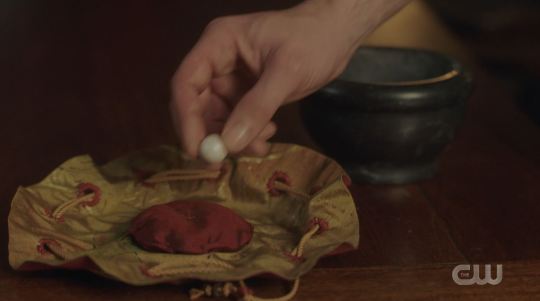
In particular I’m going to talk about the pearl as holding special significance as the object which permits Dean to confront (and make peace with) the ghost of John Winchester. The pearl helps to move on Dean’s psychological haunting by an internalised construct of his father, which has oppressed and repressed him for so long - part of the Jungian Shadow-work of the season.
So, why was a pearl the magical object chosen to grant Dean’s wish-of-the-heart, thus altering the time-lines to resurrect John Winchester?
Pearls have significance in the Bible as metaphors for Heaven, because of their beauty and value...
In Revelations, the gates of Heaven are made of pearls, hence the pearly gates. And in the parable of the pearl, the “pearl of great price” is commonly interpreted to represent Heaven:
”Again, the kingdom of heaven is like unto a merchant man, seeking goodly pearls: Who, when he had found one pearl of great price, went and sold all that he had, and bought it.”
— Matthew 13:45-46,
King James Bible
So, the pearl grants Dean’s wish for what he had long imagined as a kind of Heaven - his original family, Mom, Dad, Sam and himself, all together again.
But, as with most wish stories (and I’m sure @prairiedust will be writing a great meta about fairytales and wishes) - be careful what you wish for is the maxim here.
Because Dean finds that the price the pearl exacts is too high.
If they accept the world the pearl has delivered, he and Sam will, eventually (as the timelines course correct) no longer be hunting together. Sam will be a lawyer and a kale-eating motivational speaker (a hilarious nod to Tom Cruise’s dick character in Magnolia) and Dean will be on the FBI’s “most wanted” list again. They will be separated. Neither will the brothers have the gift of their mother’s return, because Mary will never have been resurrected by Amara. Additionally, their adopted Nephilim son Jack will not exist, because Lucifer (presumably) will remain in the Cage. And finally, Castiel will not have escaped his endless obedience mind-wipes in Heaven, thanks to his transformational encounter with Dean, starting with the raising of the elder Winchester from perdition. Instead, Cas will stand at that dick-in-Heaven functionary Zaccharia’s side, and will neither know nor love the Winchesters. He will still belong to Heaven (and not to Dean).
So, the pearl can be understood as the pearl of great price, because the price the pearl requires is simply too great, and the “Heaven” it offers is a false one.
Dean chooses (with Sam’s full assent) in the end, all the pain, all the suffering of his and Sam’s lives, including his 40 years in Hell and Sam’s agony in the Cage with Lucifer, because that journey has brought them to who and where they are now. Dean chooses the found family that their journey has brought, not the (impossible) fantasy family of his boyish imaginings.
JOHN: (to Sam and Dean): “And now you live in this secret bunker, with an angel and Lucifer’s kid?”
later....
JOHN (to Dean): “I guess that I’d hoped eventually that you would… get yourself a normal life, a peaceful life, a family…”
DEAN: “I have a family.”
(And oh boy is that ever the kind of conversation that happens between a hetero-normative parent and their queer kid - but that’s another meta).
However, there’s more, because as well as representing too great a price, and a false Heaven, thanks to its Biblical associations, the wish-granting pearl in Lebanon also links to the season’s Jungian themes.
A pearl has also (I argue) been chosen by Dabb and Glynn as the episode’s wish-granting object, because of that object’s connection to alchemy.
Jung’s key interpretive understanding of the mystical pseudo-science of alchemy, is his revelation that the transformation of matter in medieval alchemical texts can be understood as representative of the (potential for) the soul’s psychological journey towards greater self-actualization.
“The alchemical operations were real, only this reality was not physical but psychological. Alchemy represents the projection of a drama both cosmic and spiritual in laboratory terms. The magnum opus had two aims: the rescue of the human soul and the salvation of the cosmos. What the alchemists called ‘matter’ was in reality the [unconscious] self...”
Carl Jung in Speaking: Interviews and Encounters ( p228) (in a 1952 interview with Mircea Eliade).
Here is one of the earliest printed books on alchemy (originally 1546, by the reputed alchemist Bonus Ferrara, but translated into English, as here, in 1894):
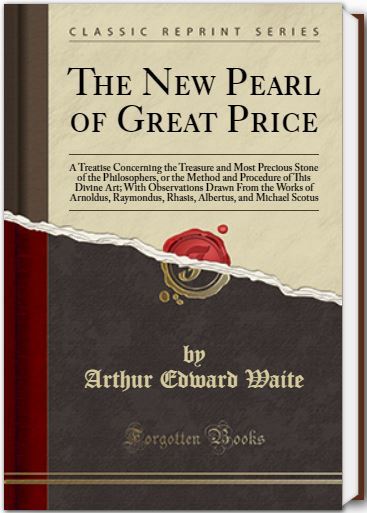
You can actually read a copy of the translated text itself here:
https://archive.org/stream/newpearlofgreatp00laciiala/newpearlofgreatp00laciiala_djvu.txt
The “pearl of great price” is another name for the “Philosopher’s Stone”. On a material level, in alchemy, this is the supposedly mystical and magical substance which could turn base metals like mercury into gold. So alchemical texts, like Bonas’ one above, read in part as weird chemistry recipe books. But, on a metaphorical level, this chemistry was understood (in Bonas’ book and elsewhere) as analogous to the soul’s journey to God:
“The Sages represent the Stone as bearing the same relation to the metals which is borne by form to substance, or, soul to body.”
Jung takes that Christian interpretation of alchemy (made by correspondence of the world below with the world above) and transmutes it into a psychological one. For Jung, the alchemical work is the work which psychoanalysis can assist a person with - the work of facing and integrating with one’s Shadow self.
My previous series of meta on S14 and the Shadow is here:
http://drsilverfish.tumblr.com/post/180906003584/the-shadow-14x08
http://drsilverfish.tumblr.com/post/181122764984/14x09-the-spear-jungian-decoder-ring-edition
http://drsilverfish.tumblr.com/post/182299438269/jung-and-deans-journey-towards-self-integration
http://drsilverfish.tumblr.com/post/182486474324/ouroboros-in-prophet-and-loss-14x12
So, how does the episode’s pearl of great price (aka the Philosopher’s Stone, aka the mystical substance which makes possible the soul’s journey to God, aka, according to Jung, that which makes possible profound psychological progress) happen for Dean, in particular, in Lebanon (given that he was the one whose wish the pearl granted in the first place)?
Well, Dean has been running from an internalised psychological construct of his father, a haunting by John Winchester’s ghost, if you will, for a very long time.
The opening sequence to 14x13 Lebanon is key in recognising this. Because one of the flashbacks we get is to 14x04 Mint Condition, in which Dean confronts the ghost of “Hatchet Man”.
Here is the 14x13 Lebanon flash-back at the start of the ep. Dean, with the axe:

confronts the ghost of the comic store owner, animating the life-size model of “Hatchet Man”:

As my meta on Mint Condition made clear at the time,
http://drsilverfish.tumblr.com/post/179735406854/batman-vs-superman-connection-and-conflict-in
the episode, “...invites us to see Stuart’s conflict with the ghost of his father-figure, the comic store owner, as a mirror for Dean’s conflict with the ghost of his own father, for whom AU Michael (in the narrative arc of S14) acts as a mirror (AU Michael = John Winchester = Dean’s own internalised repression via the metaphor of Dean’s “drowning” possession by Michael).”
That the psychological construct of the ghost of John Winchester has been a very repressive internal construct, for Dean, is further symbolised in S14 both by Dean locking AU!Michael in a closet in his mind AND by the Ma’lak box Dean has built and has been intent on locking himself inside for all eternity.
Just to re-emphasise this, the opening sequence of 14x13 also shows us AU!Michael once again banging on the doors of Dean’s mind-closet:

Dean repressed a lot of himself in order to be a “good little soldier” for his Dad, in order to try and be the parent for Sam that his Dad was manifestly failing to be, and in order to embody the kind of (straight) masculinity he thought his father approved of.
So we can think of John in 14x13 Lebanon as partly representing the opportunity (at last) for Dean to confront that internal “ghost of John Winchester”, i.e. for Dean to confront a part of himselfL

When Dean is able to hear his father tell him he is proud of him, when Dean is able tell his father, out loud, that he loves him, when Dean is able to tell his father that he has a found family that includes Castiel and Jack, when Dean is able to tell Sam out loud (as a result of his encounter with his father) this:
DEAN: “Look, we’ve been through some tough times, there’s no denying that, and for the longest time, I blamed Dad. I mean, hell, I blamed Mom too, y’know, I was angry. But, say we could send Dad back, knowing everything, why stop there? Why not send him even further back, and let some other poor sons of bitches save the world? But, here’s the problem? Who does that make us? Because I gotta be honest. I don’t know who that Dean Winchester is. And I am good with who I am...”
that is Dean being able to tell himself all those things:
I am proud of you
I love you
I have a “found family” whom I love
I am good with who I am.
Jung tells us that the more we run from the Shadow, the more its terrifying haunting power over us grows. It is only when we turn and confront it, and embrace it (as the repressed parts of ourselves) that we can achieve psychological growth.
As I said in my meta last week on “The Riddle of the Sphinx” in 14x12 Prophet and Loss:
“The Jungian solution, which the S14 narrative is offering to the metaphorical Riddle of the Sphinx, is, to turn around and embrace the Shadow-self (the parts of oneself one has repressed) and in so doing, to evolve - to become more fully human.
http://drsilverfish.tumblr.com/post/182482293379/the-riddle-of-the-sphinx-14x12-prophet-and-loss
The pearl of great price in 14x13 Lebanon, in symbolising the transformative alchemical power of the Philosopher’s Stone, has enabled Dean, in confronting and embracing the ghost of his father, to undertake some powerful Shadow-work. Shadow-work that will, eventually, help him to defeat both the repression locker in his mind where AU!Michael resides and the eternal repression locker represented by the Ma’lak box.
#Supernatural#SPN meta#14x13#Lebanon#The ghost of John Winchester#Jung in S14#Dean vs repression#Dean is bisexual#Still subtext#Meta
192 notes
·
View notes
Text
The Road This Far
Originally posted 1/13/2021
I think we can all agree, 2020 sucked. While individual things happened to brighten our days, as a whole, the entire year beginning in March all around was horrible.
One of the things that sucked was the sudden lack of new media content. Movies were pushed back, television shows stopped production, Podcast formats changed a little. 2020 impacted a lot of things. And one of those things was the final half of the final season of the 15-year long cult classic television show Supernatural.
The show, which should have ended with a bang in May of 2020, halted production with seven episodes to go. The once all-star cast that was supposed to return for the Series Finale was scrapped due to the global pandemic and instead concessions needed to be made and the final episodes were scaled down for safety reasons.
I’ll give a brief rundown of the final two episodes. While the final three were the ones that raised a whole heap of controversy, I’m not going to bother with episode 15x18 for the moment, because while I think it was poorly done, my reasoning is different from others and honestly, that could be a blog post all its own.
Warning: Below this (for the 5 people on the planet who haven’t either watched it or heard about it somewhere) will be spoilers for the final two episodes.
Episodes 15x19 “Inherit the Earth” and 15x20 “Carry On” were the quintessential Series finale and epilogue a show this long running needed.
The opening of “Inherit the Earth” finds everyone on Earth Prime (inside joke) gone, disappeared. The Rapture has come, and it seems that only Sam, Dean and Jack are the only ones alive. And a dog named Miracle (who I feel was the shows rally cry and the one I was invested in. I mean dammit Chuck, you Thanos-ed the world but then you took that adorable dog away from Dean. I hope you go DOWN!)
Jack feels a presence and is led to a church. Inside they find Michael. Archangel Michael, still in the body of Adam. He’s hidden out from God’s wrath and wants to help the Winchesters take down God. In the previous episode, the brothers get Death’s book, but only Death can open it. They’re hoping that Michael can override the lock, but it doesn’t work. Dean gets a call from Cas asking for help and to open the bunker door (obvious red flag because…Cas is gone, but okay…) Outside is not Cas but Lucifer with a reaper. Lucifer wants to help get rid of God. To do that, he kills the reaper he has hostage thereby making her the next Death. Death opens the book and begins to read.
Meanwhile, Lucifer and Michaels big show down seems to be just smack talking back and forth. When Death comes back and begins to read the passage of the book that tells how to stop God, Lucifer stabs Death, killing her and takes the book. Surprise, it seems he was playing for both sides of the team. Who didn’t see that coming? Lucifer pulls a “join me” speech to Jack giving Michael the opportunity to kill Lucifer by metaphorically stabbing him in the back.
The four then make plans to stop God. Going out to a particular spot, Sam begins to cast a spell he says he found from the book. Chuck appears, having been warned by Michael (remember that stab to the back?). Michael’s reward for serving his Father is death. Chuck snaps him out of existence and then turns his sights on the Winchesters. In true final Big Bad mode, instead of snapping them out of existence, he decides to beat them both into submission. But the Winchesters will. Not. Stay. Down.
In the plot twist that Chuck did not write, when Death made Jack into a bomb and sent him to the Empty, the explosion had a different sort of effect. Basically, he’s become a metaphysical power vacuum. When Lucifer and Michael were fighting in the Bunker, Jack was absorbing their power. Each time Chuck punched one of the Winchesters, Jack absorbed the power until finally Jack was powerful enough to confront Chuck. With one hand to the face, the power transfer was complete and hosannah on the highest, Jack becomes God, leaving the now very much human Chuck to fend for himself.
Raised by the Winchesters and having Castiel as his surrogate father figure makes Jack the chilliest supernatural being ever. He snaps back everyone (including Miracle) and tells the brothers that he is keeping a hands-off approach. He’ll be there but humans are responsible for their own outcomes from now on. He disappears and the episode ends with the Winchesters riding off into the sunset.
Episode 15x20 “Carry On” picks up five years after. Miracle is living with the Winchesters at the Bunker and they’re just going around living their lives. Still hunting monsters, saving lives. Dean even gets to a pie festival, a nice nod to Dean’s love of pie. Everything looks like it’s back to normal.
They come across a suspicious death and kidnapping of two children, one that Dean recognizes from their father’s journal. They find it and discover that it’s a nest of vampires that only hunt once every couple of years, keeping their victims alive to drain them dry.
The Winchesters go to where the nest is and find the vampires and the kids. Sam gets the kids to safety while Dean starts taking on the nest. During the fight, already there’s hints that this is not going to be a normal battle. The Winchesters are down more than they’re up and not fighting as a unit. Sam is knocked down several times and while they managed to kill the nest, the final vampire grapples with Dean and slams him up against a post, where there was a piece of reverb sticking out. Sam cuts the head off the final vampire. That’s when he realizes Dean had been stabbed and moving him off the spike would do more damage. Dean asks Sam to stay with him, knowing his journey is over.
With the exchange of power form Chuck to Jack, the Winchesters are no longer God’s “Chosen Ones” anymore, meaning they are just like all the other Hunters who have come before them. Their lucky charm is gone. In what is arguably the most emotional scene in the series, Sam stays with Dean until he dies.
Sam returns to the Bunker and gives Dean a Hunter’s funeral. He only remains at the Bunker for a bit longer until he gets called to a job and leaves (with Miracle) the bunker forever.
Dean wakes up in Heaven and has a talk with Bobby on the porch of Harvelle’s Roadhouse. This, I think was part of the things they had to work around. As much as I would have loved to see Ellen and Jo greet Dean (I think it would’ve been extremely emotional), I also understand why it wasn’t done. Bobby explains Heaven. Where it was once a line of doors where souls were destined to relive one memory over and over, it is now the Paradise it was promised to be. The woods and open country are host to (almost)everyone Dean knows and loves; His parents, Rufus, Ellen and Jo, other Hunters who have been his “family” along the way. It’s almost perfect. Dean tells Bobby he’s going for a drive and climbs into Baby. The song, poetically, on the radio is “Carry On” by Kansas and Dean drives.
The montage bounces then between Dean driving and Sam living his life. You find he was married and became a father to a son he named Dean. The years fly by as Dean drives and it is understood that Sam finally had the life he wanted from the start, the family, the son he plays ball with and help with homework.
The final scene is an older Sam on his deathbed His son comes to him, holds his hand, tells him he loves him and it’s okay to go. The scene changes to Dean stopping on a bridge overlooking a river. He gets out of the car and hears a noise behind him. It’s Sam. The two brother’s hug and then go to stand by the railing of the bridge and look out…together.
The End.
Even knowing that this was the pandemic ending and not the ending they planned, I enjoyed these final two episodes. Like I said, episodes 19 and 20 played like a finale and the epilogue.
The story of Supernatural has always been about the Winchester brothers. From the beginning, during the middle and at the end, the story was always going to begin and end with Sam and Dean. Everyone else in the story were just side characters.
It was not surprising to me that the very vocal majority hated it. I had a “been there, done that, bought the tee-shirt” moment when I began to scroll social media and watched post by post of people who shouted that they felt cheated and that this was not the ending they were promised. Even people who never watched the show and should’ve known better where shouting for something that was, quite obviously, never going to happen.
I waited this long because, I was busy with something else and I wanted to wait until I thought through everything before I put down my thoughts. So a month later, I watched two videos on You Tube, from Destiel shippers discussing their thoughts on the final season. I won’t name names.
The first video was almost two hours long and was from a person who admits they left the fandom for a while. While a lot of things I could sympathize with, they brought up the term queer bating multiple times (I am not going to get into the criticism of queer baiting because, this post is already too long, and I plan on writing a blog about that later) as well as the dangers of bringing fandom theory into creator spaces.
I am of the firm belief that fandom content should not be brought into creator spaces. Not only do most showrunners have their own ideas for the shows, but there is also the inherent risk of ego stepping which could lead to drastic changes being made to shows in ways fans weren’t expecting and don’t like (I see you Jeff Davis). It can also lead to legal issues, especially if during one of these and idea coming from fandom space nudges it’s way into the creators’ mind and there is unintentional plagiarism. It can happen and is a reason that most creators do not read fanfiction or discuss fan theory until after the show is over.
The other reaction video mentioned they were disappointed (and I saw this in other spaces as well) of Castiel being in Heaven but not seeing Dean. I have a theory about that. In Episode 19 at the end, Jack states that unlike Chuck, he has faith in the humans, and he plans on being strictly “hands off”. Our fate is in our own hands now and we can do what we want. Where Chuck liked the accolades and often sent angels to do his dirty work on Earth, especially when the Winchesters weren’t doing what he wanted, if Jack is implementing a “Hands off” approach, this could also mean that the remainder of the angels (old and new) were given instructions to remain “Hands off” as well. They have their side of Heaven which they are rebuilding and reorganizing, but they are to stay on their side and never the twain shall meet. Angels were never meant to walk among the human races. This is maintaining the status quo. Dean knows that Castiel is in Heaven once more but is content with that knowledge. Once Sam appears to him on the bridge, Dean has everything he wants; his brother, his family, and a quiet life in which to settle. At last, Sam and especially Dean have found their reward.
As the song goes, there is peace when they are done.
0 notes
Text
My relationship with religion is very, very complicated, because I’m very openly queer and very openly religious in a household of two atheist scientists. (I also, more generally, believe in a bunch of mystical/supernatural things that have no evidence of existing, and I don’t like talking about those much in public spaces just on account of people telling me I’m Wrong. Mate, I might be, but I’d rather be safe than sorry and exclude getting murdered by a demon, so here we fucking are.)
Y’know, I went to temple this week for the first time in, uh, a while, and the sun shone through the stained glass windows and blinded me specifically, and I’m under the impression that it was a callout from G-d Himself.
I have an impending migraine, but I’d love to have this conversation with you at some point, definitely! It’s oddly hard to engage with religious discourse in Supernatural, specifically because I am religious, it just feels... oddly personal in a way that, say, queer readings don’t, even though it’s just as important to me? I dunno.
Honestly‚ most Christian views of G-d creep me the fuck out
As well they should imo, because they’re fucking creepy (she said, abandoning every particle of tact). There’s a lot of good in Christianity too, but it’s creepy af, and I honestly dont see how anyone can be a thinking Christian of good faith without grappling with that.
We were speaking about Blood Libel in my Jewish Life and Culture seminar and the entire “the blood of Christian children is used in rituals and Jewish people eat it” thing and how that is nonsense on literally all levels, and I just turned to the dude next to me, who’s a student of Catholic Theology, and he muttered “we metaphorically eat the body and drink the blood of Jesus”. I’ve not yet gotten over that. (But seriously, that weird concept of a punishing G-d that comes up a lot creeps me the fuck out, okay)
Anyway, here’s my first scattered thoughts, which I’ll come back to once I have the time/patience/health, or ideally all three of the above.
Because some of my favorite, and to my mind most central, aspects of S4-5 SPN seem to me to be a not-entirely-comfortable mush of Christian and Jewish in value structure?
Yes, totally! And I think that on the one hand, having that really uncomfortable mixture actually works well and is better than just going with the Christian thing all the way? On the other hand, it’s still. Urgh. I actually think it’s interesting how the first five seasons are more Jewish in a lot of aspects than the later ones, even if it is mixed with Christian theology.
Please don’t hesitate to talk about Dean with me! I know I’m super critical of him, but there’s aspects of this character that are incredibly intriguing, and I am vastly more fond of early seasons Dean than I am of what his character is currently. I’m sure I couldn’t possibly tell you why that is. (I’m kidding, we all know why.)
Okay, this is going to be a weird sentence, but bear with me here: Dean is more Jewish, and Sam is more Christian. Not literally, obviously, but just in their writing and their approaches to religion. Not clear cut, of course, but... in some ways. Like, very bluntly put: Dean’s not religious, literally calls out G-d himself, he largely doesn’t give a fuck about destiny. Whereas Sam... Sam believes that “maybe he could be saved”, that there’s a plan for him, signs, he’s in awe of the angels and of G-d, it’s more Christian coded? I feel like my thought process behind this requires way more explanation, sorry.
But! But! On the other hand, the Jewish concept of the devil, different as it might be, is interesting in the context of Sam? Because... okay, so... Satan’s more of an adversary in a general sense? There’s yetzer hara, the urge to to evil, and yetzer hatov, as the urge to do good, and those are present in every human being (very loosely defined, but you know), and he’s representative of the former, I guess. He’s not as powerful as G-d and not a direct antagonist to G-d, and was, in fact, created by Him, so he still, in a sense, falls under G-d jurisdiction. (And I think you can actually say that this is the case for a lot of the s4/s5 and s11 storylines? So, yeah.) He’s more of a, I don’t know, roadblock put there by G-d? Evil inconvenience? But he’s to be overcome, and being hindered by him isn’t a failure of you as a person?
And I think that’s so, so interesting in the context of Sam’s ongoing grapple with being “unclean” from almost birth on due to the demon blood and the assumption that there’s something inherently evil in him all the way to being Lucifer’s true vessel. Because the way Sam struggles against that is by taking these things and using them to do as much good as he can.
(There’s... oh, there’s s8, there’s 8.21, there’s “You want to know what I confessed in there? What my greatest sin was? It was how many times I let you down.” and how there’s our concept of sins that G-d forgives - not keeping the commandments etc., essentially every sin that goes against Him and His word - and the ones He cannot forgive, because you committed them against another person and not against G-d? I don’t now how to actually word what I’m trying to get at here, but there’s something I’m trying to say, I’m sure of it.)
As you can tell, I haven’t sorted my thoughts out about this at fucking all, but [waves hands around] things are happening
@gaywitchtwins wrote:
#It’s just… historically and culturally an issue to compare Judaism and Christianity in those terms#Which I know you weren’t trying to do or anything! But I just wished to clarify.#Honestly‚ most Christian views of G-d creep me the fuck out
If now (or ever) isn’t the time you want to engage on this topic, that’s totally, completely fine. In addition to your own reasons, it’s also true that I’m afraid I’ll no doubt be an unknowledgeable conversation partner and will put my foot in my mouth at times, for which I apologize in advance. So just ignore all this if you’re not up for dealing, and/or read but dont reply if you think you might want to engage but then at the bottom are like ‘er nope’. That said, I’d really enjoy discussing SPN with another person for whom spiritual/religious questions are important in their lives, even if it’s a totally different religion from mine, because that seems kind of (I suppose not surprisingly) rare in SPN fandom. So if you’re up for it at any time, have at it, and tag me.
I was raised Christian/UU, and as an adult I’m a convert Buddhist. A bunch of my family is Jewish, and I was support staff in a(n observing) Jewish nursing home for a year or so when I first got out of high school, so I’m not completely ignorant. But I’ve never lived in an observant household, so I’m probably still largely ignorant.
I do know that it’s an issue lumping Judaism and Christianity together, and it did kinda give me the heebie jeebies doing it, but I did also kind of actually do it on purpose. Because some of my favorite, and to my mind most central, aspects of S4-5 SPN seem to me to be a not-entirely-comfortable mush of Christian and Jewish in value structure? (I apologize if I’m talking out my butt here). And then post-S5 it’s, as you noted, all Christian value-structure piggybacked onto and replacing that, and it’s taken a turn for the worse because of it imo. I’m not talking about the lore so much as this:
On the other hand, it would be Jewish culture to fight G-d in a warehouse in hand to hand combat. So. Y’know.
(long post is long)
Keep reading
#I did not expect to be able to make myself sad about Sam in this conversation‚ but now look at me#Sorry @ everyone who has not followed me for religious discourse‚ but this just... happens sometimes...#It actually happens a LOT‚ but usually not on this sideblog#chiisana sukima#replies
16 notes
·
View notes
Text
New Post has been published on Literary Techniques
New Post has been published on https://literarytechniques.org/hyperbole-poems/
Hyperbole Poems
Hyperbole appears in poetry almost as often as metaphor. After all, to quote Wordsworth, poetry is “the spontaneous overflow of powerful feelings” and powerful feelings ask for exaggerated language. However, bear in mind that the Romantics were much fonder of hyperbole than modern poets are. In fact, some of the latter argue that it is precisely because of this overuse of hyperbole that numerous 19th-century poems sound a bit melodramatic to today’s ears. See if you agree with this claim by going over our examples below.
10 Famous Poems with Hyperbole
#1: Dante Alighieri, Paradiso XXI.4-12 (1320)
She did not smile. ‘Were I to smile,’ she said, ‘You would be turned to ash, as Semele was when she saw Jupiter in his full Godhead;
because my beauty, which, as it goes higher from step to step of the eternal palace, burns, as you know, with ever brighter fire;
and if it is not tempered in its brightening, its radiance would consume your mortal powers as a bough is shattered by a bolt of lightning.’
(tr. John Ciardi)
As he discovers, level by level, the beauties of Paradise, Dante has the privilege of gazing upon ever more radiant and ethereal sights. However, his guide, his beloved Beatrice, is dazzling to start with—even while alive on Earth—and, apparently, her beauty “burns…with ever brighter fire” every step of the way. Naturally, Dante happens upon the same problem horror writers encounter: the inadequacy of language to describe such supernatural sights. So, he opts for the same solution as they do: an over-the-top hyperbole. As she explains to the poet In the XXI canto of Paradiso, Beatrice withholds her celestial beauty from the eyes of Dante—it is apparently “tempered in its brightening”—because, one smile of hers would be enough for Dante to be “shattered” as a bough is by a bolt of lightning; or, for that matter, as any mortal has ever been after even so much laying his eyes upon a deity. (Beatrice uses Semele as an allusion, but compare with the words of Yahweh to Moses in Exodus 33:20: “You cannot see my face, for no one may see me and live”).
#2: Christopher Marlowe, Tamburlaine (1588)
I hold the Fates bound fast in iron chains, And with my hand turn Fortune’s wheel about; And sooner shall the sun fall from his sphere Than Tamburlaine be slain or overcome.
If Marlowe’s Helen was “the face that launched a thousand ships,” his Tamburlaine was the play which launched a thousand plays. The first popular success on the Elizabethan stage, Tamburlaine also features the first of English drama’s titanic want-it-all heroes, referred to usually as “over-reachers.” And it only fits that an over-reacher should use hyperboles in his speeches. In the four colossal verses above, notes Heinrich F. Plett in Oxford’s Encyclopedia of Rhetoric, “as is proper for a work of literature, the hyperbole appears as a mythological metaphor.” Majestic.
#3: William Shakespeare, King Lear I.1.54-60 (1606)
Sir, I love you more than word can wield the matter; Dearer than eye-sight, space and liberty; Beyond what can be valued rich or rare; No less than life, with grace, health, beauty, honour; As much as a child e’er lov’d, or father found; A love that makes breath poor and speech unable; Beyond all manner of so much I love you.
At the beginning of William Shakespeare’s King Lear, the eponymous monarch makes one of the most bizarre decisions in the history of hereditary dynasties; namely, to divide his kingdom among his three daughters based on how much each of them loves him. Needless to say, It’s hyperbole-time! First comes Goneril, the “eldest-born,” and she doesn’t hold back on the exaggerations: there are many comparatives, superlatives and improbable claims made in the speech quoted in full above. Even so, Regan, Lear’s second daughter, is not impressed. “She comes too short,” she says, which in Shakespearean terms is the equivalent of “Yours was good, but mine will be better.” And it is: “I profess/ Myself an enemy to all other joys/ Which the most precious square of sense possesses,/ And find I am alone felicitate/ In your dear Highness’ love” (I.1.71-75). Now, how’s that for a hyperbole? (And also, as we learn later in the play, a blatant lie.)
#4: Ben Jonson, “To Celia” (1616)
Drink to me only with thine eyes, And I will pledge with mine; Or leave a kiss within the cup, And I’ll not ask for wine. The thirst that from the soul doth rise Doth ask a drink divine; But might I of Jove’s nectar sup, I would not change for thine.
I sent thee late a rosy wreath, Not so much honoring thee As giving it a hope, that there It could not withered be. But thou thereon didst only breathe, And sent’st it back to me; Since when it grows, and smells, I swear, Not of itself, but thee.
Ben Jonson’s most famous short poem, “To Celia,” is basically a string of hyperboles. Already the first—often misunderstood—verse is a beautiful metaphoric exaggeration: you can, say, drink to someone’s health with a cup of wine, but you can’t do it with your eyes; however, when you’re in love with someone, it certainly seems that you can. It also seems that you’d gladly trade a cup of wine for a kiss, even if the latter is not on your lips, but merely left on the empty glass; that’s the meaning of the third and fourth line of Jonson’s poem. He explains why in the four verses which follow. Namely, the thirst of his soul is greater than the thirst of his body, so he’d rather have an empty cup stained with a kiss of his beloved, than one full of nectar, the drink of the gods. This same hyperbolic tone permeates the second stanza as well, in which the poet swears that merely a breath of his beloved upon a rosy wreath he had sent her made the flowers smell of her. To put this elaborate hyperbole in a simpler and more conventional one: his loved one smells even more beautiful than the roses.
#5: Alexander Pope, Peri Bathous, or the Art of Sinking in Poetry (1728)
The silver whiteness that adorns thy neck, Sullies the plate, and makes the napkin black.
Nothing new: in his hilarious 1728 essay Peri Bathous, Pope ridicules the poetical and imaginative deficiencies of his contemporaries. Possibly the best part: chapters X and XI, in which he illustrates the ridiculous way in which the bad poets of his time use some literary devices. The couplet above, in Pope’s words, should serve as a courteously romantic description of a lady at dinner. However, it is so extravagantly hyperbolic (she is so white that the napkin seems black) that, instead of being romantic, it is actually comical. Pope lists quite a few similar examples, one of which (a description of misery) is almost as funny: “Behold a scene of misery and woe;/ Here Argus soon might weep himself quite blind,/ Ev’n though he had Briareus’ hundred hands/ To wipe those hundred eyes.” So impossibly over the top!
#6: Robert Service, “The Cremation of Sam McGee” (1907)
There are strange things done in the midnight sun By the men who moil for gold; The Arctic trails have their secret tales That would make your blood run cold; The Northern Lights have seen queer sights, But the queerest they ever did see Was that night on the marge of Lake Lebarge I cremated Sam McGee.
Sensational by definition, horror writers turn to hyperbole for effect remarkably often. Robert Service’s most famous poem, “The Cremation of Sam McGee,” is a great example of this. The above is the opening—and closing—stanza of it, and it already sets the tone for the rest. This is not merely a “queer” sight Service is about to recount, but “the queerest,” one “that would make your blood run cold;” note how the hyperbole is even more exaggerated by the personification of the Northern Lights. However, the narrator doesn’t stop here. Already in the second stanza, he says that “God only knows” why Sam McGee left Tennessee, and that, even though “the land of gold seemed to hold him like a spell,” he hated the cold so much that he was often heard saying that “he’d sooner live in hell.” And, indeed, we are informed in the third stanza, in arguably even more hyperbolic manner, that the cold “stabbed like a driven nail” through the parkas of the gold diggers. Well, no wonder Sam was “ghastly pale” and “chilled clean through the bone”! There are a few more hyperboles in “The Cremation of Sam McGee;” read the poem and try to identify the rest.
#7: Edward Lear, A Book of Nonsense (1846)
There was an Old Man with a beard, Who said, ‘It is just as I feared! Two Owls and a Hen, Four Larks and a Wren, Have all built their nests in my beard!’
Edward Lear, “that crazy old Englishman,” is now primarily known for popularizing the form of the limerick and the genre of literary nonsense. The nonsensical effect in Lear’s limericks is often the result of a hyperbolic description; this can be easily evidenced already in the first poem of his first nonsense book, copied in full above. Just like Cyrano de Bergerac’s nose (see below), the beard of Lear’s Old Man is so, khm, distinguished, that no less than eight birds could fit a nest within it.
#8: Edmond Rostand, Cyrano de Bergerac I.4 (1896)
Oh, no, young sir. You are too simple. Why, you might have said— Oh, a great many things! Mon Dieu, why waste Your opportunity? For example, thus:— AGGRESSIVE: I, sir, if that nose were mine, I’d have it amputated—on the spot. FRIENDLY: How do you drink with such a nose? You ought to have a cup made specially. DESCRIPTIVE: ‘Tis a rock, a crag, a cape! A cape? Say rather, a peninsula! INQUISITIVE: What is that receptacle? A razor-case or a portfolio? KINDLY: Ah, do you love the little birds So much that when they come to see you, You give them this to perch on. INSOLENT: Sir, when you smoke, the neighbors must suppose Your chimney is on fire. CAUTIOUS: Take care— A weight like that might make you top-heavy. THOUGHTFUL: Somebody fetch my parasol— Those delicate colors fade in the sun! PEDANTIC: Does not Aristophanes Mention a mythological monster called Hippocamp-elephanto-camelos? Surely we have here the original! FAMILIAR: Well, old torchlight! Hang your hat Over that chandelier—it hurts my eyes. ELOQUENT: When it blows, the typhoon howls, And the clouds darken! DRAMATIC: When it bleeds— The Red Sea!
In Cyrano de Bergerac, Edmond Rostand’s marvelous play, the title character is an impetuous, iron-willed French soldier of many talents. However, he is also awfully self-conscious on the part of his “rather large nose.” And that’s exactly how his enemy, Viscount Valvert, describes it in the fourth scene of the first act of the play. Cyrano replies with the unforgettable speech above, basically forcing Valvert to insult him in a more proper manner. As you can observe even at first glance, the speech is an almost textbook example of the various ways one can hyperbolize a description. And note that the above is merely an abridged version: we haven’t included the simple or the military account, the respectful or the literary version. The bottom line: when you want to insult someone, don’t hesitate to use hyperboles, because mere description just won’t do; it lacks the most important aspect: the emotional excess.
#9: Hilaire Belloc, “Matilda” (1907)
Matilda told such Dreadful Lies, It made one Gasp and Stretch one’s Eyes; Her Aunt, who, from her Earliest Youth, Had kept a Strict Regard for Truth, Attempted to believe Matilda: The effort very nearly killed her, And would have done so, had not she Discovered this Infirmity.
Children respond to hyperboles much more emphatically than they do to realistic, descriptive language. That is why most cartoons are littered with images of excessive violence; ironically, it is the exaggeration which makes the violence more palatable, and the message more graspable. Even though this practice goes way back to the cautionary tales present in the folklore of most nations, it was first popularized by a German psychiatrist named Heinrich Hoffmann, whose 1845 children’s book, Struwwelpeter (or, Shock-headed Peter) is a series of rhyming tales with a moral which the author regularly demonstrates by exaggerating the consequences of misbehavior. Hilaire Belloc parodied the genre in his Cautionary Tales for Children, as evidenced by the full title of the poem excerpted above: “Matilda, Who Told Lies, and Was Burned to Death.” In the opening stanza we are informed that Matilda’s lies are not only “gaspingly” and “eye-stretchingly” dreadful, but that they would have also killed her aunt if she only believed them!
#10: Dorothy Parker, “Comment” (August 16, 1925)
Oh, life is a glorious cycle of song, A medley of contemporanea: And love is a thing that can never go wrong; And I am Marie of Roumania.
Two-time Academy Award-nominee Dorothy Parker was an American poet, critic and satirist who justly enjoys the reputation as one of the greatest wits and wisecrackers of the 20th century. For example, upon being told that Calvin Coolidge, the 30th US President, had passed away, commenting on his stiffness and taciturnity, Parker immediately replied: “How can they tell?” That’s a great hyperbolic remark in itself, but the one-stanza poem quoted here is, arguably, even better. After paraphrasing two conventional exaggerations (“life is a glorious cycle of song” and “love is a thing that can never go wrong”), Parker adds another one “I am Marie of Roumania.” However, since this last line is obviously ironic—i.e., she is most certainly not Marie of Romania—the reader is invited to revisit the previous two hyperboles and realize that Parker is, in fact, cynical. Thanks to this poem, the phrase “And I am Maria of Romania” is now regularly used when someone wishes to express disbelief (it is similar to another ironic hyperbole of the type: “Yeah, and I’m the Queen of England!”)
1 note
·
View note
Text
John Winchester’s Ghost and the Haunting of S12 cont...
The resurrection of Mary Winchester has brought with it the ghost of John Winchester, as the S12 writers’ room snakes the narrative back on itself to disinter its origins.
Here is his journal, as Mary reads its pages in The Foundry (12x03)

And here is his wire-wrapped baseball bat, which Dean had apparently been using in 12x15 Somewhere Between Heaven and Hell - ”Man! Dad loved that thing.” (Also, apparently, a reference to Jeffrey Dean Morgan’s character on The Walking Dead).
It’s interesting, and deliberate on the part of the writers’ room, that Dean name-checks one of his father’s favorite weapons at a point in the story when, in working with the BMOL, Sam and Dean are taking a step backwards towards their father’s black and white view of the supernatural. A view which they have themselves evolved away from over the years, thanks to friendships and alliances with supernatural beings, from Amy the Kitsune (Sam was always ahead of the game in this regard) to Benny the Vampire.
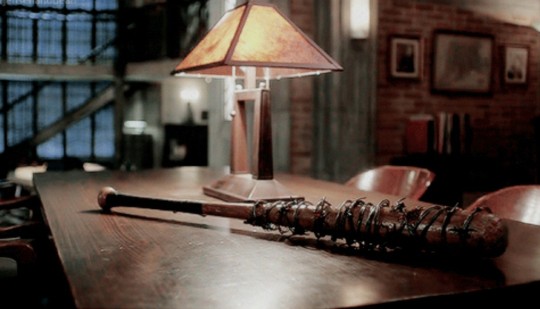
As well as John’s diary and John’s baseball bat, we’ve also had Mary’s silent recollection of making out with John in Baby in 12x01 Keep Calm and Carry On.
If John has been physically manifest in objects imbued with his memory - journal, base-ball bat, Baby; Dean and Mary’s confrontation in 12x14 The Raid brings his less than stellar parenting close to being named in an actual conversation:
Mary: “I am your mother but I am not ‘just a mom’. And you are not a child.”
Dean: “I never was...”
Meanwhile in the mirrors and parallels of S12, John’s ghost is everywhere.
In The Foundry (my favourite episode of the season to date) we meet Lucas, the ghost boy murdered by and tethered to vengeful spirit Hugo Moriarty. The name Lucas recalls the kid Lucas from 1x03 Dead in the Water whom Dean had a special affinity for. Lucas was mute with grief after losing his Dad and Dean tells him that he was that way himself for a while after his own Mum died (Mary).
Hugo Moriarty is (in part) a mirror for John. Hugo lost his daughter in a car accident and went mad with grief, walling himself up in the house and starving to death then murdering children and tethering them to him. John lost Mary to Azaezel and he also went “mad” with grief, walling up himself, and his kids, in his obsessive revenge quest.

In 12x04 American Nightmare (with its deliberate callback to 1x14 Nightmare, as signalled by Sam and Dean disguising themselves as priests on both occasions), Magda’s parents, fanatically religious and living off the grid, also mirror John Winchester (likewise fanatical, about revenge, and living off the grid with his kids, raising them as hunters on the road).

Magda is both a mirror for Sam, as a kid with special, supernatural powers (just as Max Miller mirrored Sam in 1x14 Nightmare) and for Dean (another layer of subtext down) as an abused queer kid. This second parallel is invoked by depicting Magda as a kid being punished by religious parents attempting to “cure” her (read “conversion” therapy). Like Sam’s parallel, this Dean mirroring in American Nightmare also invokes the old parallel from its twin episode, Nightmare, of Dean with Max Miller, whom we find out was beaten regularly throughout his childhood by his father and uncle. Remember that this (1x14) is the episode, where we get a hint that Dean may have protected Sam from a lot more than Sam knows regarding John’s drinking and (possible) violence.
Back in our present, Sam and Dean set Magda free (a giant metaphor for being, or needing to be, on a path towards setting themselves free of some of the psychic baggage of their childhood) but, and here comes another John mirror, Mr. Ketch swoops in and murders her.

Mr. Ketch is a John mirror (although that’s not his only function in the narrative) in that we have seen him seduce Mary to the BMOL and attempt (and partially succeed for now) to seduce Dean likewise (12x14 The Raid). That’s partly why there have been two references to Sirens this season, because that particular supernatural creature works by seduction and thus provides an excellent metaphor for the BMOL and their seduction of the WInchesters.
Dean hero-worshipped his Dad when he was younger, Sam never did (which is partly why Ketch (semi) works on Dean, but not on Sam - his bike evoking the Easy Riders soundtrack Dean and Mary both share a love for, for instance.
Moreover, we learn Mr. Ketch used to date Lady Toni Bevell in 12x14 The Raid, so, as others have pointed out, her kid might be his. Another neglectful / monstrous parent this season? Hmmmn.... hello John Winchester.
Demonic father-to-be Lucifer is also, this season, paralleled with John. Not only is he on his way to becoming a Bad Daddy, but his minions want to “Make Hell Great Again”. He is an authoritarian and he is a purist (he hates humans) in the same way that the BMOL are (they hate the supernatural). Both mirror John’s black and white perspective, the one he raised his boys in, and against which they have come to rebel (Sam before Dean).
Here is Lucifer looking all corpsified and gross in 12x07 Rock Never Dies (hello corpse ghost of John Winchester:
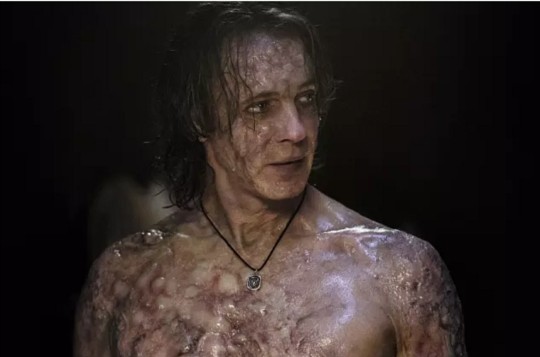
In 12x05, The One You’ve Been Waiting For, we meet Nazi necromancer Nauhaus and his son Christoph, who have the following exchange:
NAUHAUS: “You were supposed to be my heir. Instead, you're an inconceivable disappointment.” CHRISTOPH: “You know, I used to look up to you. You conquered death. You did so many things. But now? (Sighs) Now all you wanna do is relive your glory days with Hitler.” NAUHAUS: (scoffs) “Your generation – you millennials – are too weak to steward the future. It needs a stronger hand. The world is divided and inflamed....”
This mirrors something of the history of Sam and Dean with their father - his insistence they call him “Sir” from the early seasons, Dean’s anxiety about living up to his father’s expectations, Sam’s rebellion and John’s anger (because Sam wanted to go to college), the way Dean used to look up to his father. Additionally, once again, we see a father-figure with an absolutist view of the world. What would John make of the grey area Sam and Dean now inhabit? Dean’s relationships with Benny, Cas, Crowley??
Nauhaus tries to have his son killed (remember when Dean was dying in 1x12 Faith and John didn’t show up?) and Dean actually refers to Nauhaus sarcastically as “Father of the Year”.

Here is “Father of the Year” Nauhaus-Hitler.
Nauhaus donates his body to Hitler (there’s a sentence) re-animated by Thule blood magic and Dean (it’s important it’s Dean) kills him.
From a Winchester family psycho-drama perspective (the underlying theme of S12) Dean needs to kill the ghost of his father in his psyche. Particularly Dean, because Dean was the “good son” who repressed so much of who he was in order to be a care-taker to Sammy (a role his father persistently neglected as part of his obsession with hunting and revenge for Mary’s death).
Sadly, Hugo Moriarty is also a Dean mirror, because Dean’s co-dependency (the lesson he learned in childhood that his self-worth comes mostly from his role as family caretaker) means that he has some unhealthy patterns around trying to tether the people he loves too tightly to him and then watching them endlessly slip away.
Dean lost his childhood and he adopted a bravado, a machismo, in imitation of his father, which closeted his own more complex self (signalled by, for example, his secret love for soap operas like Dr. Sexy MD and for chick flicks). Dean felt the need to hide his appreciation for “feminine” coded thngs, that his Dad would likely disapprove of. Hence his continued anxiety about openly liking things like the fancy cucumber water in 12x07 Rock Never Dies.
This is why we get an episode titled Regarding Dean (12x11) which strips away what SPN meta fandom calls “performing Dean”. Memory-wiped Dean (regressed Dean, psychoanalytically) is soft with bunnies, exhibits a child-like quality and wants desperately to ride Larry the bull (in subtext - dick - i.e one of Dean’s represssions as a result of his father’s macho hunter upbringing is the repression of his bisexuality).
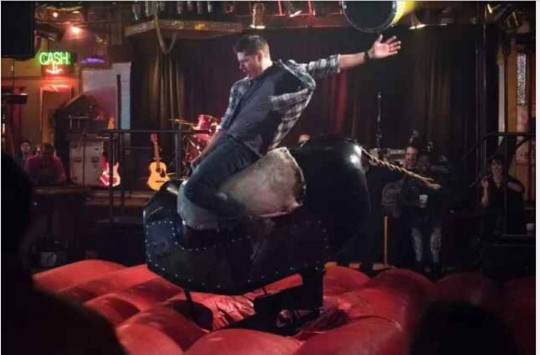
Here is Dean free of his father’s repression....
Another deadbeat Dad lurks at the edges of the narrative - namely Chuck - as Cas returns to Heaven with Kelvin on a promise to speak to Joshua in 12x15 Somewhere Bewteen Heaven and Hell. This reminds us that Joshua was the gardener angel Sam and Dean met in 5x16 Dark Side of the Moon, back when they all hoped that if they could just reach God he would intervene to stop the apocalypse.
That’s an interesting reference, Dark Side of the Moon, at this point, given that Dean’s Heaven back then contained an idealised vision of his mother feeding him pie, one he is now having to painfully deconstruct as he meets the real Mary, a woman who reveals she didn’t cook and who is all too ready to become obsessed with hunting in the way John was.
We can now, looking back, explicitly parallel the BMOL’s supernatural genocide plan with the revived Nazism we revisited in The One You’ve Been Waiting For (Dabb’s political parallel to contemporary America also being at work this season).
As Sam and Dean and Mary continue to work with the BMOL, eventually a clash of values will come to a head, between the old Winchester way (John’s) and the new one (that of his sons).
In facing this conflict, the ghost of John Winchester, still lying mostly unspoken between Mary and her sons, will certainly manifest (whether spoken out loud or continuing to haunt the narrative in a variety of mirror guises).
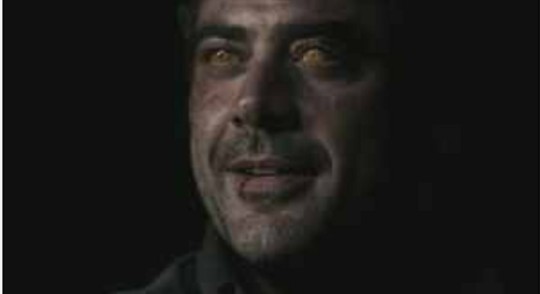
We’ve had the return of demons with yellow eyes like Azaezel, namely the other Princes of Hell - Ramiel, Dagon and Asmodeus.
This can’t help but (deliberately) remind us of Azaezel’s narrative in the early seasons. Remember his possession of John in 1x22 Devil’s Trap, and how Dean figured out that his Dad wasn’t in the driver’s seat, because the demon said “I’m proud of you”?
John was a flawed man - he wasn’t literally Hugo Moriarty or Nauhaus or Hitler or Lucifer or even Mr. Ketch. However, this haunting of the S12 narrative by his ghost, in a plethora of dark mirrors, is about his effects on the psyches of his children. What a dark lake of unspoken things lies between the resurrected Mary and her sons in that regard.
And in that sense, we can understand why John’s ghost looms so monstrously at the heart of the Winchester family psycho-drama this season, in tandem with the resurrection of “Mother Mary”.
Thanks to Supernatural’s SuperWiki and to Home of the Nutty for most of the screen-caps.
www.homeofthenutty.com and www.supernaturalwiki.com
#Supernatural#SPN meta#Meta#S12#John Winchester#John Winchester's Ghost#Wincheter Family Psychodrama#Winchester Family Dynamics
213 notes
·
View notes